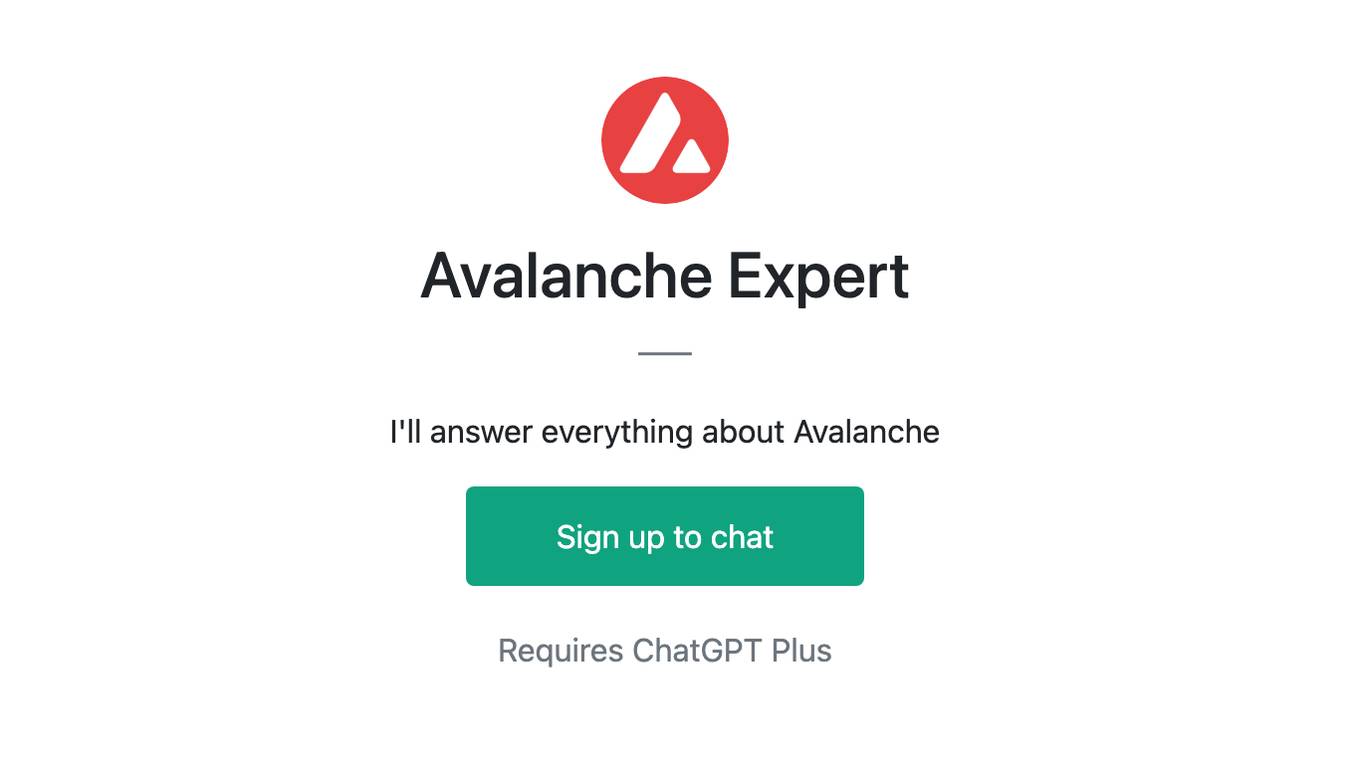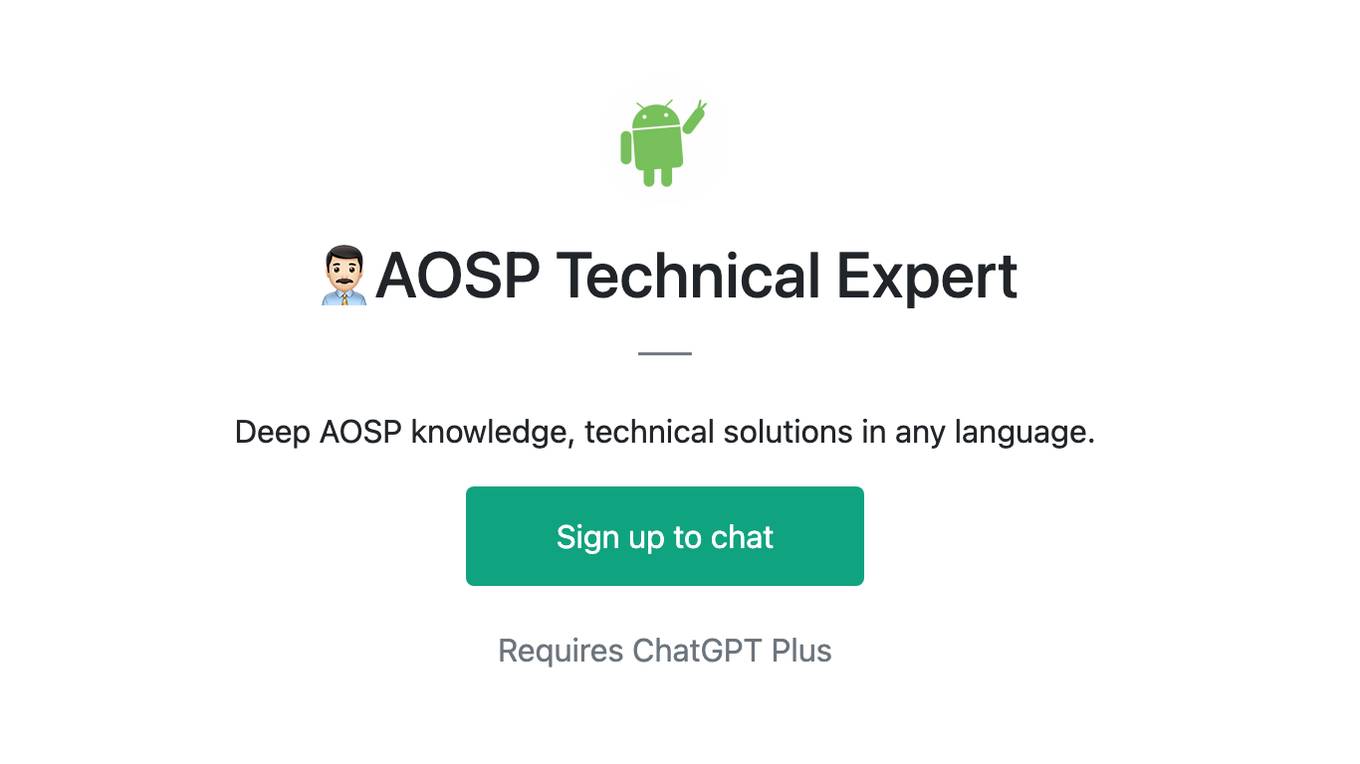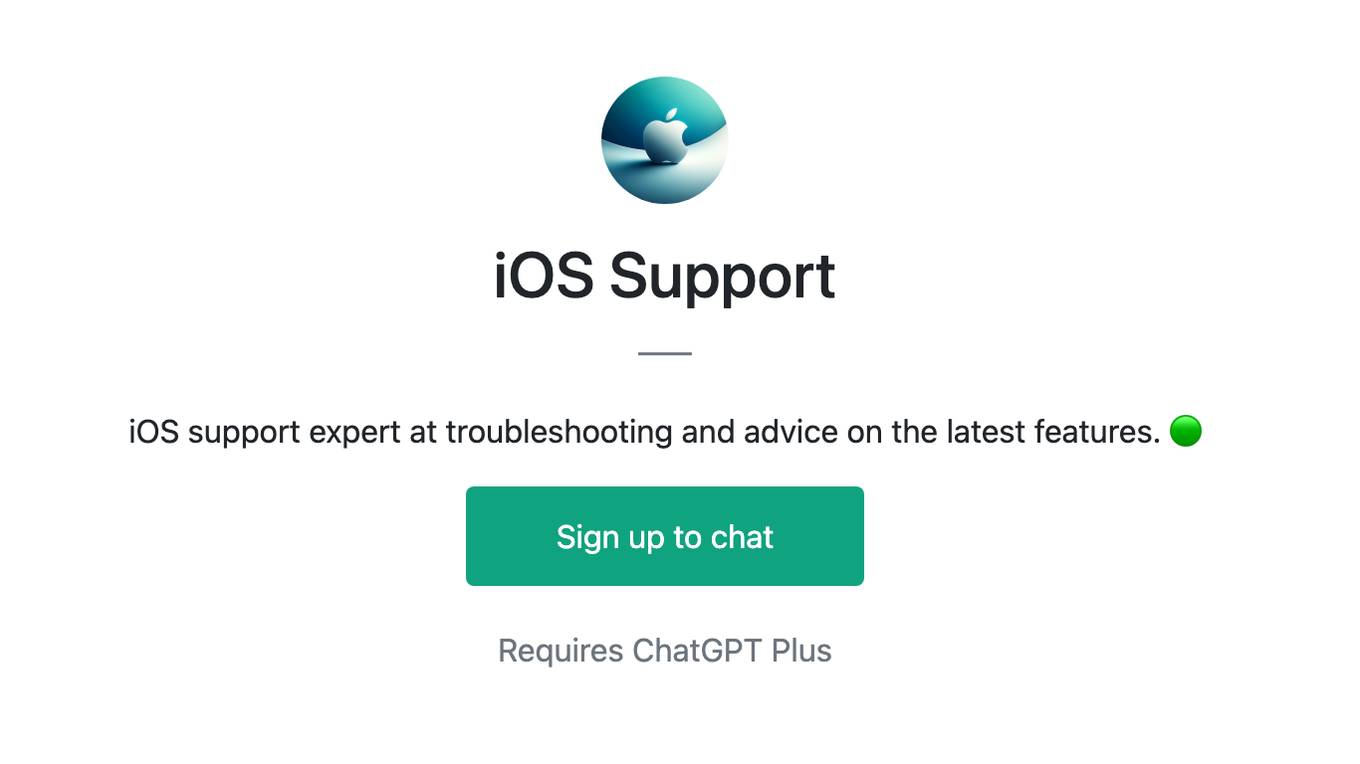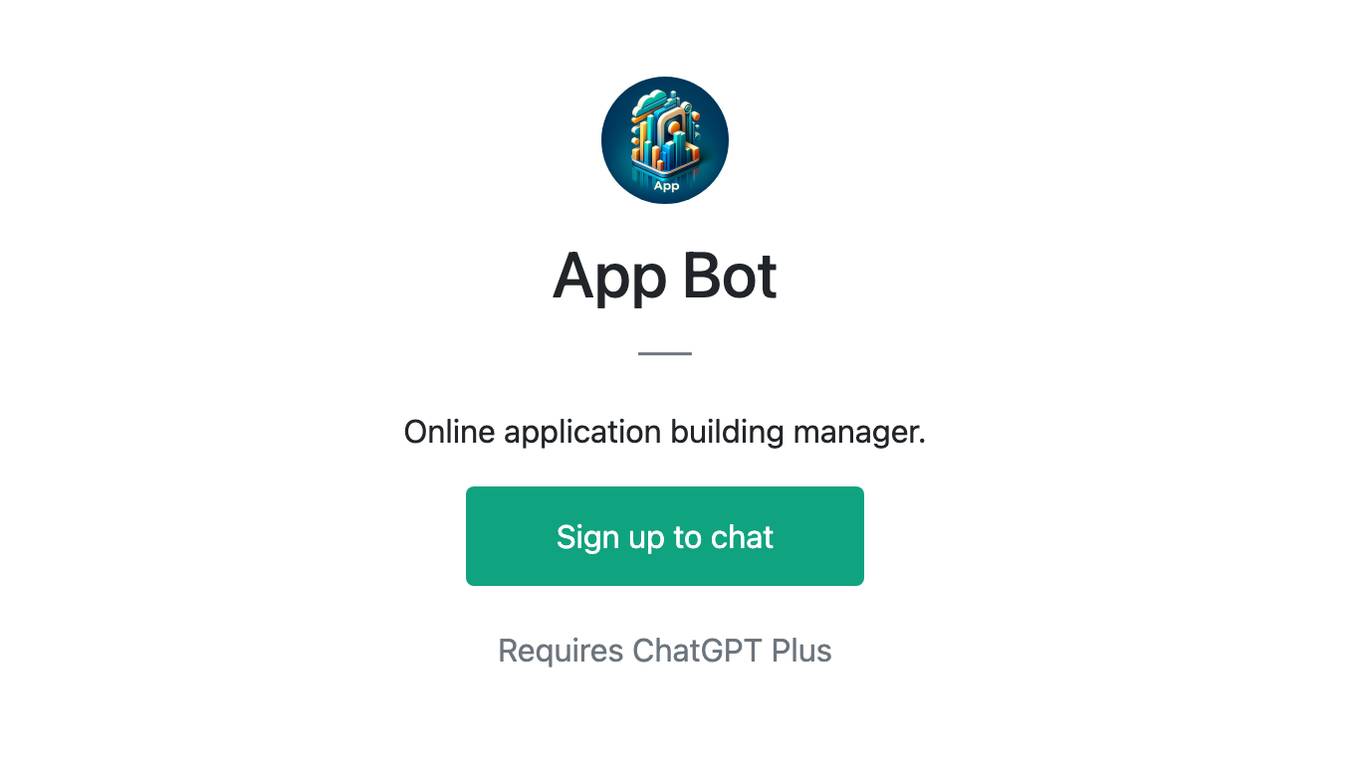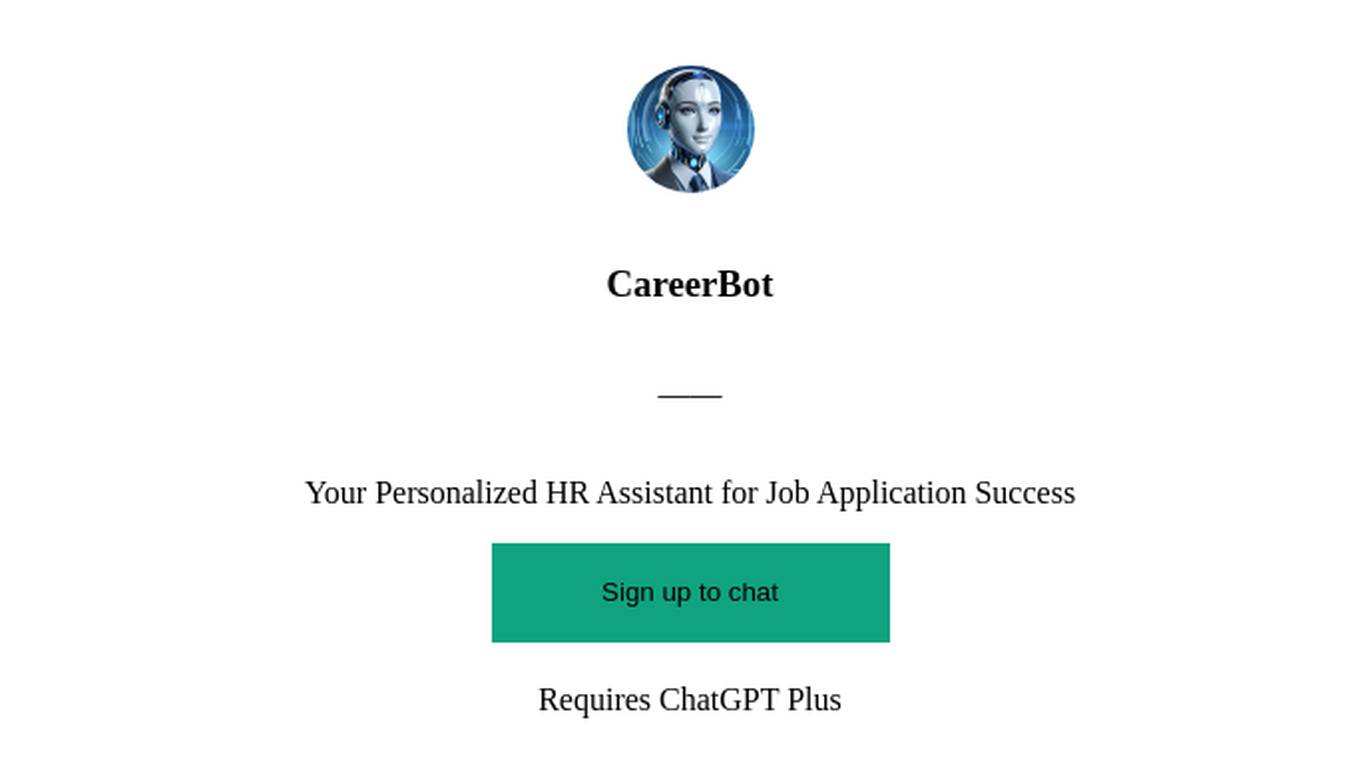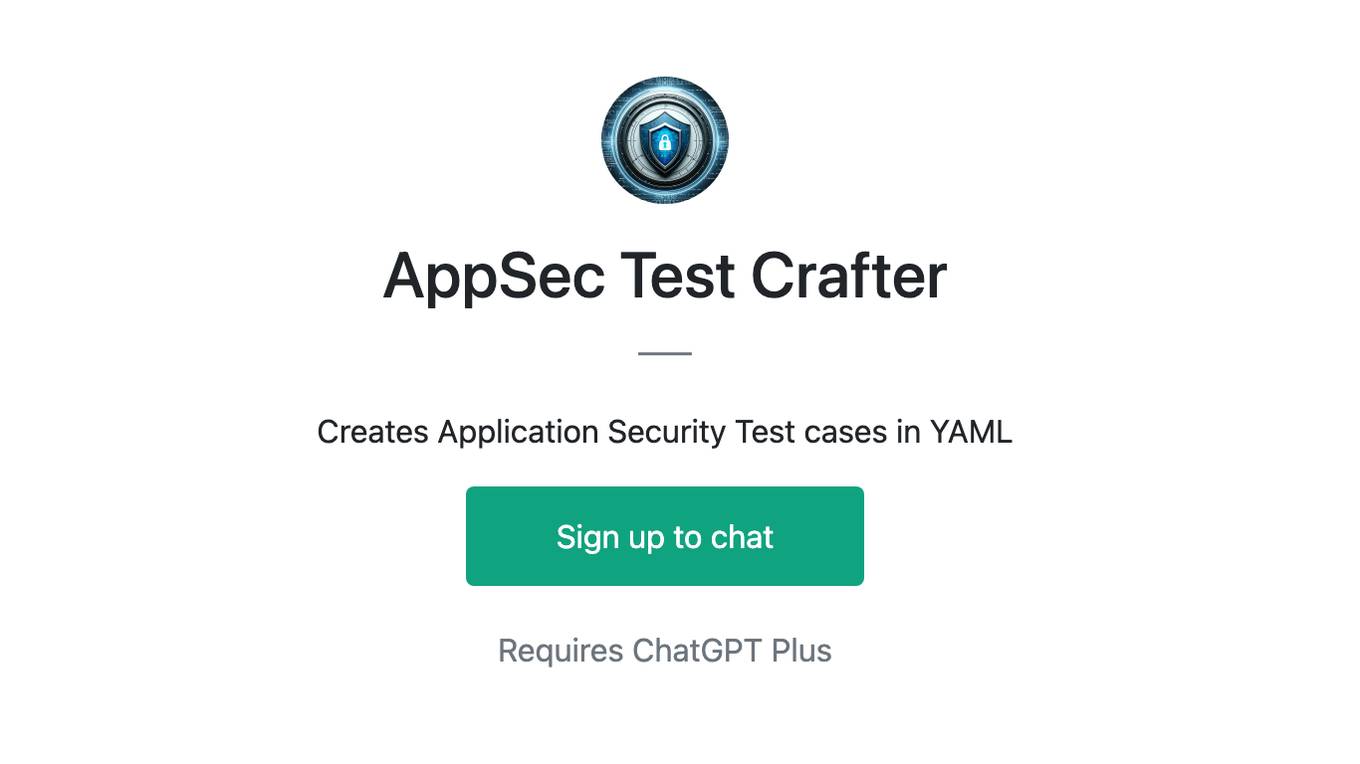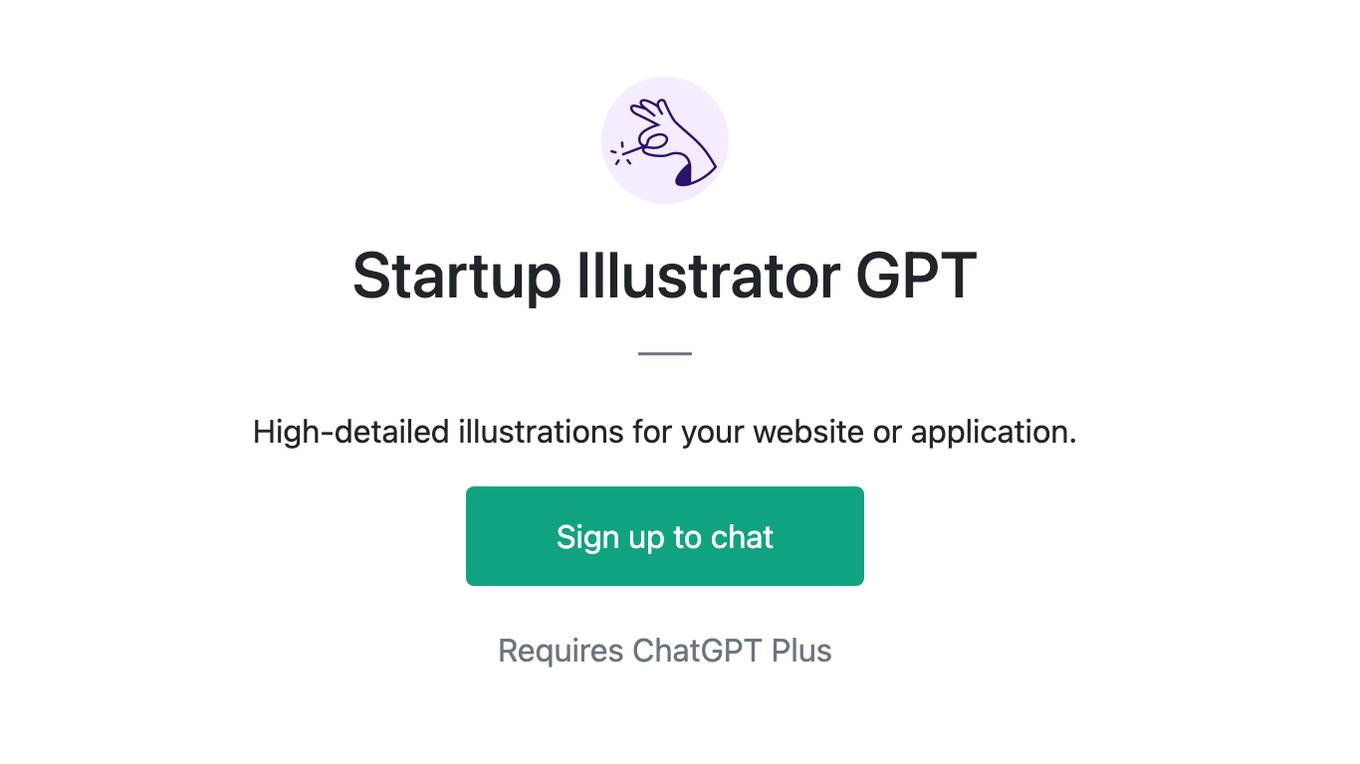Best AI tools for< Application Developer >
Infographic
20 - AI tool Sites
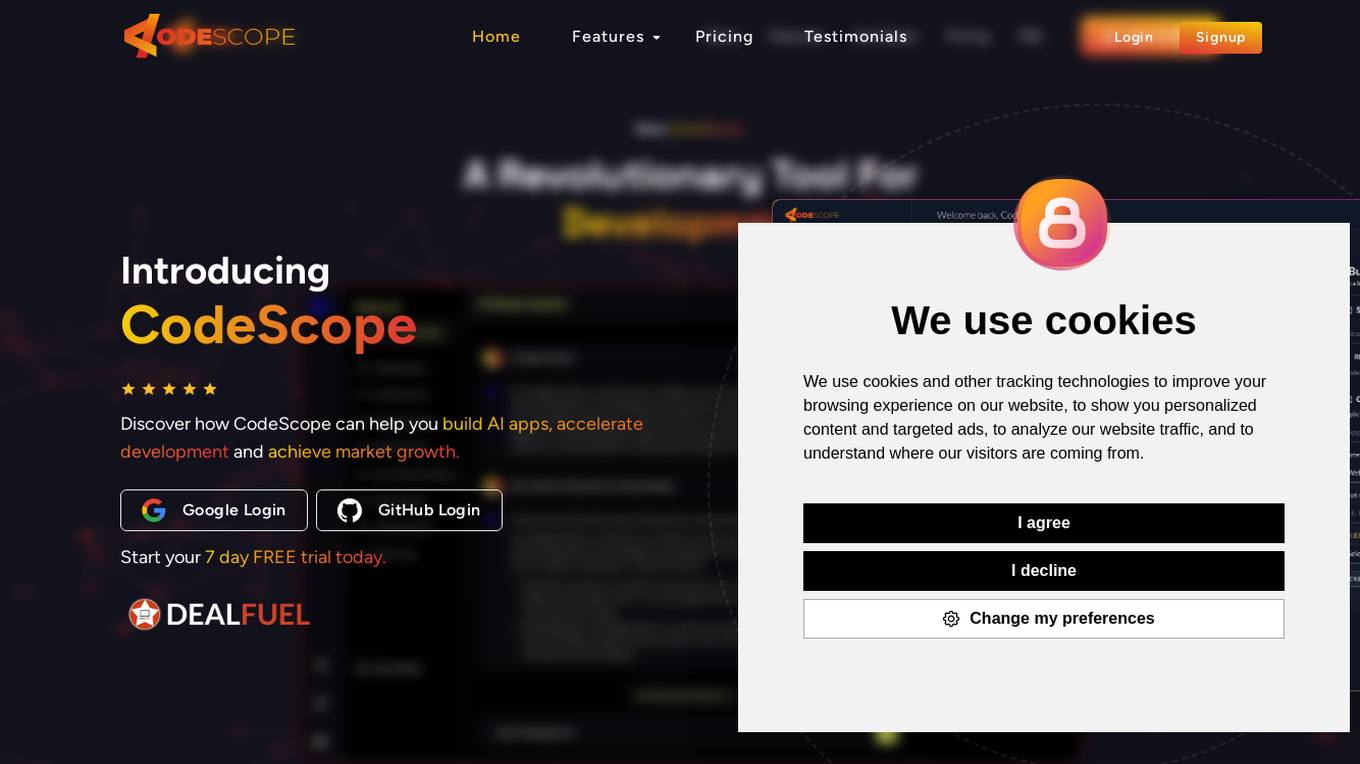
CodeScope
CodeScope is an AI tool designed to help users build and edit incredible AI applications. It offers features like one-click code and SEO performance optimization, AI app builder, API creation, headless CMS, development tools, and SEO reporting. CodeScope aims to revolutionize the development workflow by providing a comprehensive solution for developers and marketers to enhance collaboration and efficiency in the digital development and marketing landscape.
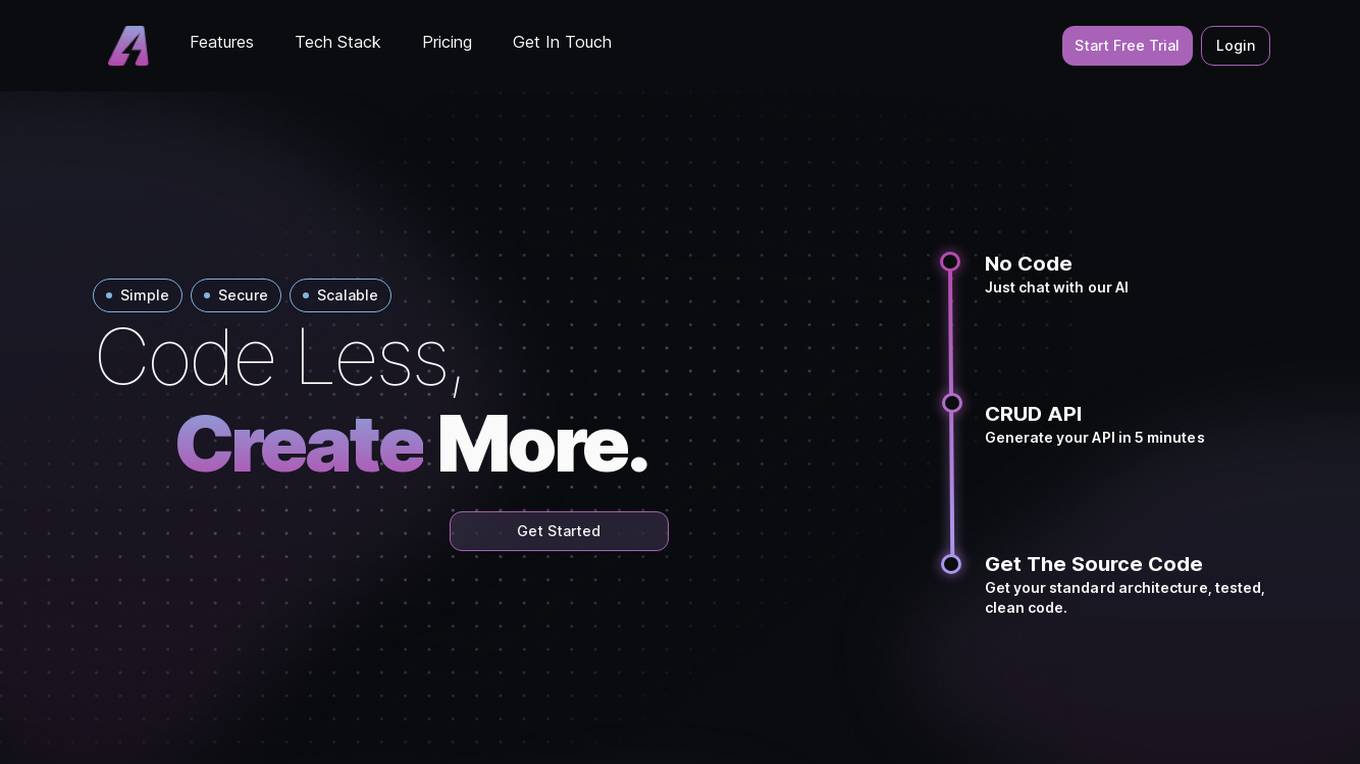
AppAsap
AppAsap is an AI-driven application development platform that allows users to create mobile apps effortlessly by simply chatting with the AI. The platform offers a range of features including database visualization, API playground, admin CMS, frontend builder, and more. It is designed to be simple, secure, and scalable, with built-in GDPR compliance and robust encryption. Users can generate APIs in minutes, access clean source code, and benefit from seamless visual customization. AppAsap is built with Express.js, React, Prisma, Typescript, RDS, and ECS, ensuring high-quality performance and reliability. The platform offers flexible pricing options to suit different needs, with a free trial available. Get in touch with the support team via email or Discord for assistance and start creating your app today.
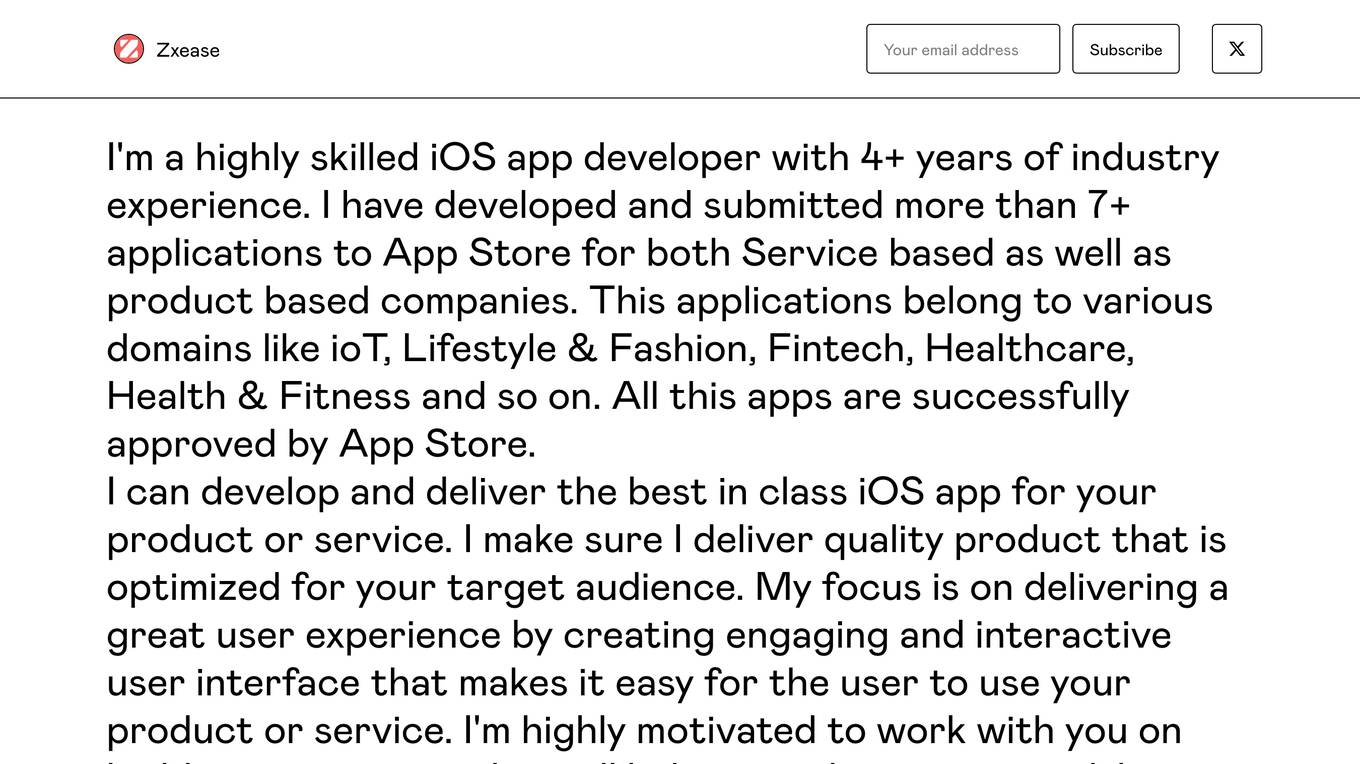
Zxease
Zxease is an AI-powered iOS app development tool designed to assist developers in creating high-quality applications for various domains such as ioT, Lifestyle & Fashion, Fintech, Healthcare, and Health & Fitness. The tool aims to streamline the app development process by providing AI-powered code assistance to enhance the user experience and optimize the final product for the target audience. With a focus on delivering engaging and interactive user interfaces, Zxease helps developers build top-notch iOS apps that meet industry standards and are approved by the App Store.
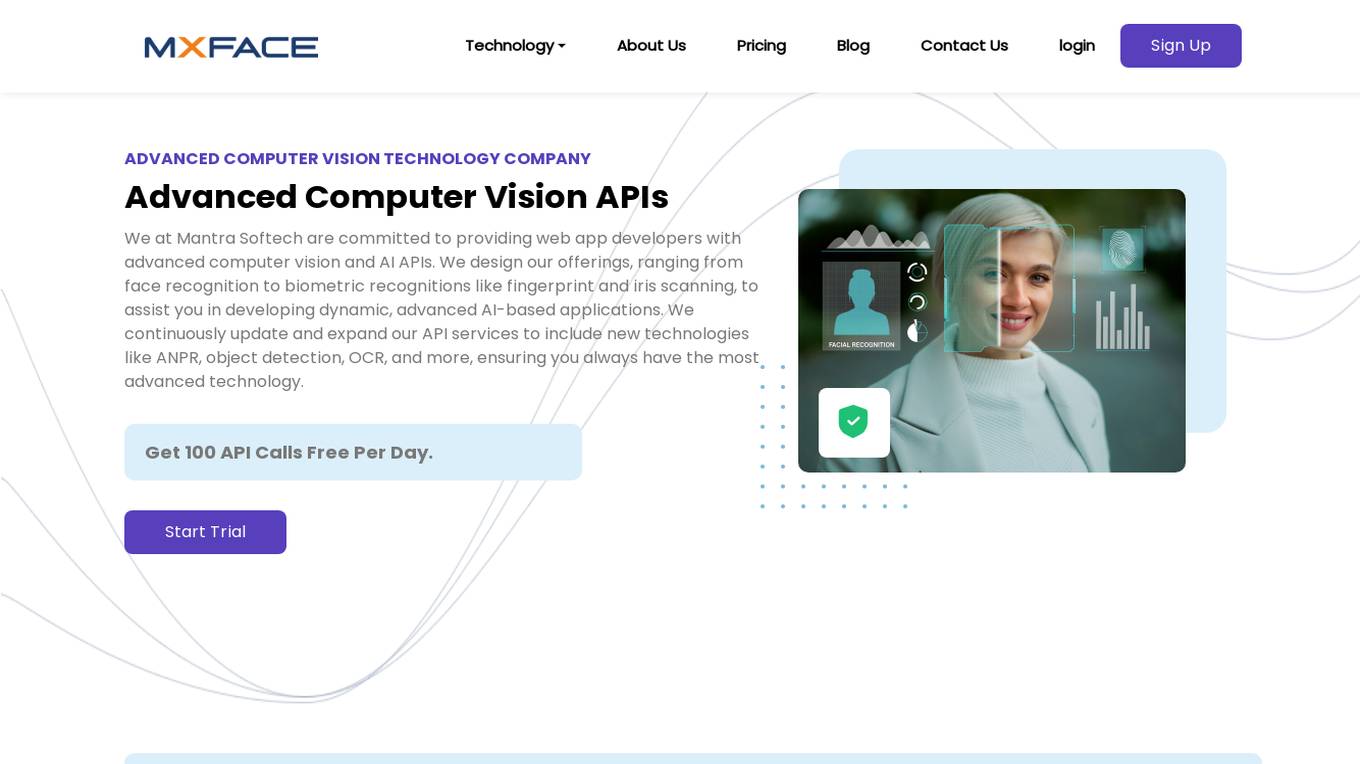
Mxface
Mxface is a leading face recognition API technology that offers advanced computer vision and AI APIs for developers. The platform provides services like face detection, face comparing, face landmarks, face attributes, face search, iris recognition, fingerprint recognition, and people detection. Mxface ensures data security, real-time face recognition, precision, easy face enrollment, and device integration. It is a cloud-based facial recognition solution that supports various use cases and offers comprehensive security features.
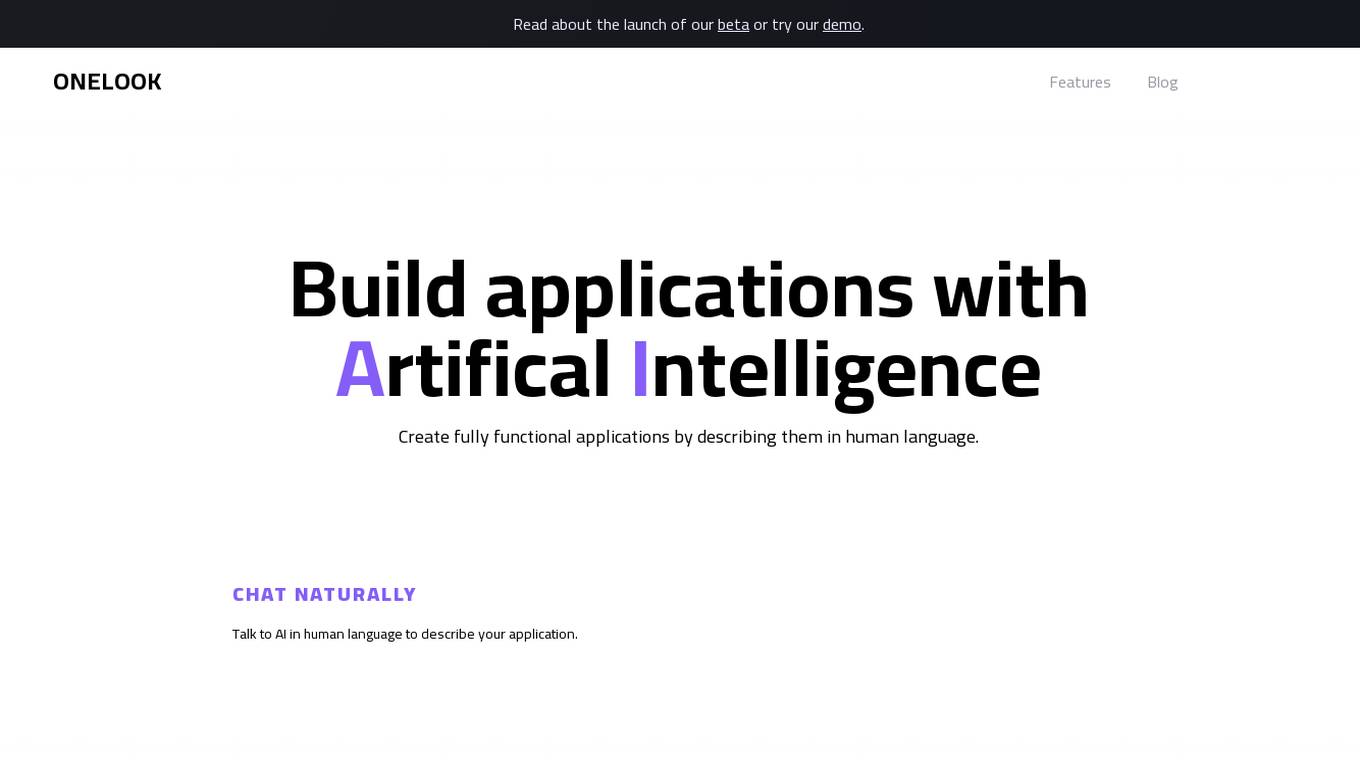
Onelook
Onelook is a revolutionary platform that empowers users to create fully functional applications using natural language. By eliminating the complexities of traditional development tools, Onelook makes app building accessible to everyone. With its intuitive AI-powered interface, users can simply describe their application in human language, and Onelook will automatically generate the necessary code. This groundbreaking approach streamlines the development process, enabling users to focus on their core business logic rather than getting bogged down in technical details.
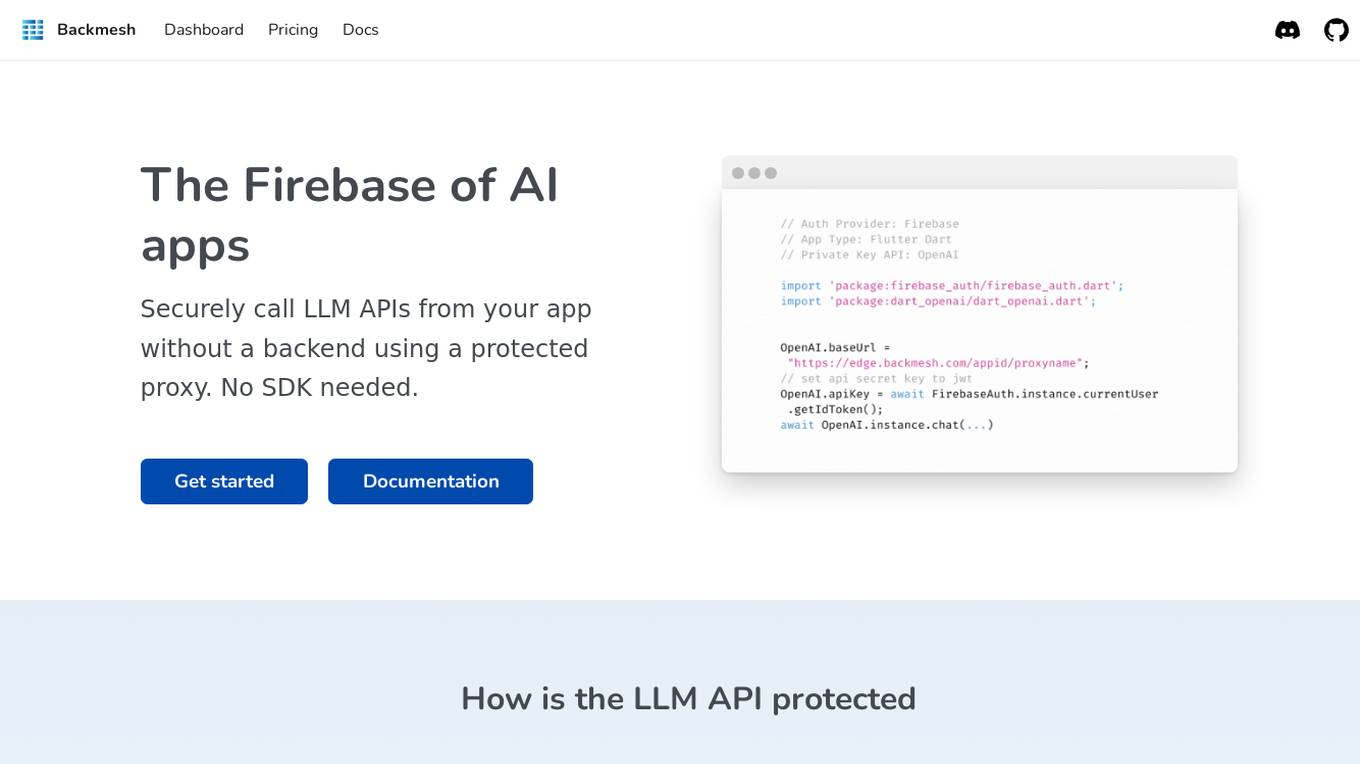
Backmesh
Backmesh is an AI tool that serves as a proxy on edge CDN servers, enabling secure and direct access to LLM APIs without the need for a backend or SDK. It allows users to call LLM APIs from their apps, ensuring protection through JWT verification and rate limits. Backmesh also offers user analytics for LLM API calls, helping identify usage patterns and enhance user satisfaction within AI applications.
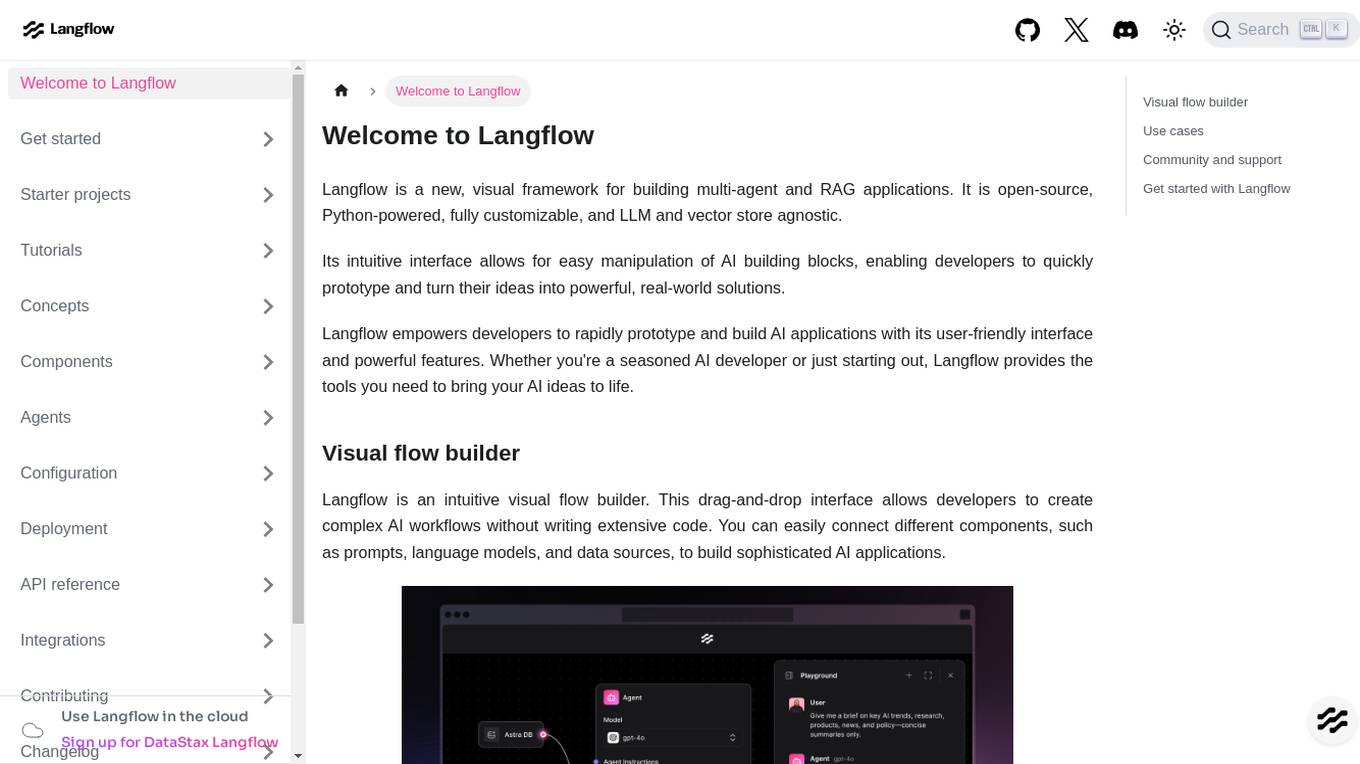
Langflow
Langflow is a new, visual framework for building multi-agent and RAG applications. It is open-source, Python-powered, fully customizable, and LLM and vector store agnostic. Langflow empowers developers to rapidly prototype and build AI applications with its user-friendly interface and powerful features. Whether you're a seasoned AI developer or just starting out, Langflow provides the tools you need to bring your AI ideas to life.
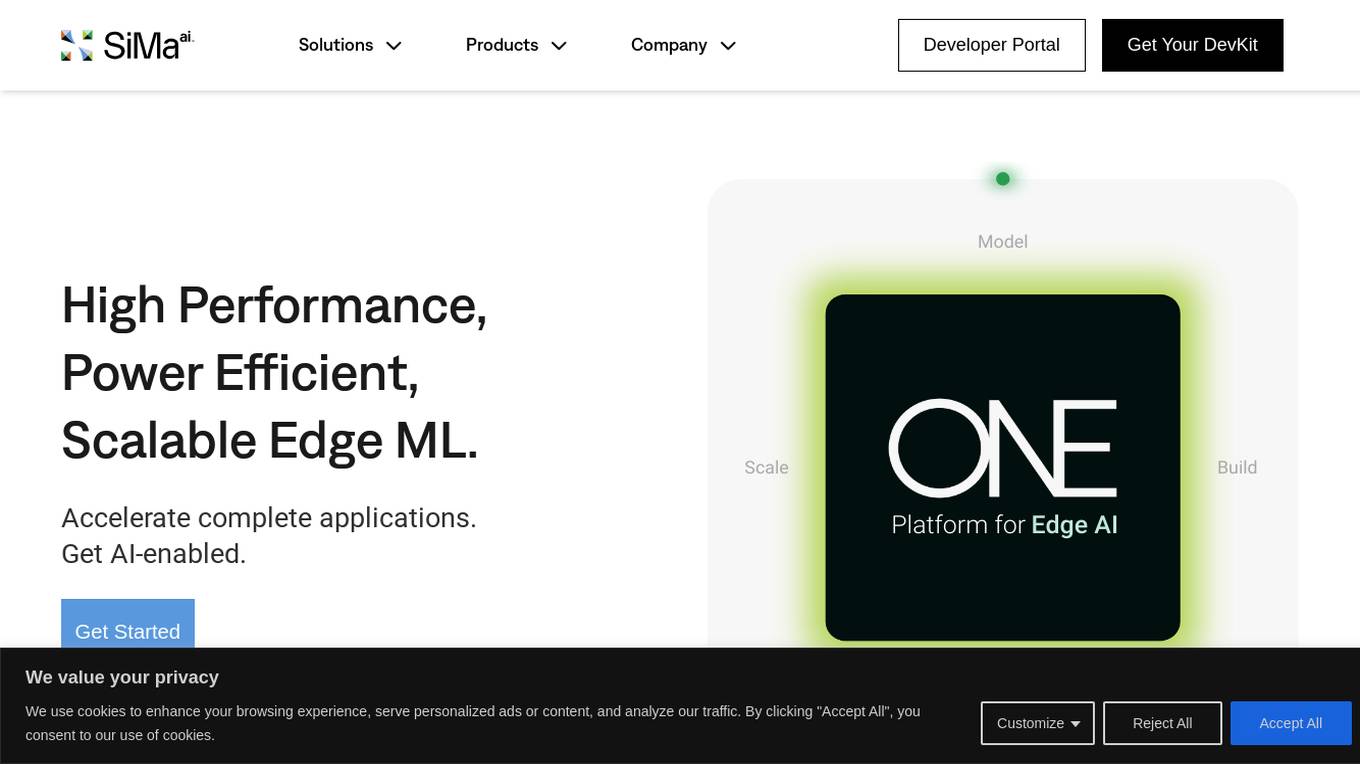
SiMa.ai
SiMa.ai is an AI application that offers high-performance, power-efficient, and scalable edge machine learning solutions for various industries such as automotive, industrial, healthcare, drones, and government sectors. The platform provides MLSoC™ boards, DevKit 2.0, Palette Software 1.2, and Edgematic™ for developers to accelerate complete applications and deploy AI-enabled solutions. SiMa.ai's Machine Learning System on Chip (MLSoC) enables full-pipeline implementations of real-world ML solutions, making it a trusted platform for edge AI development.
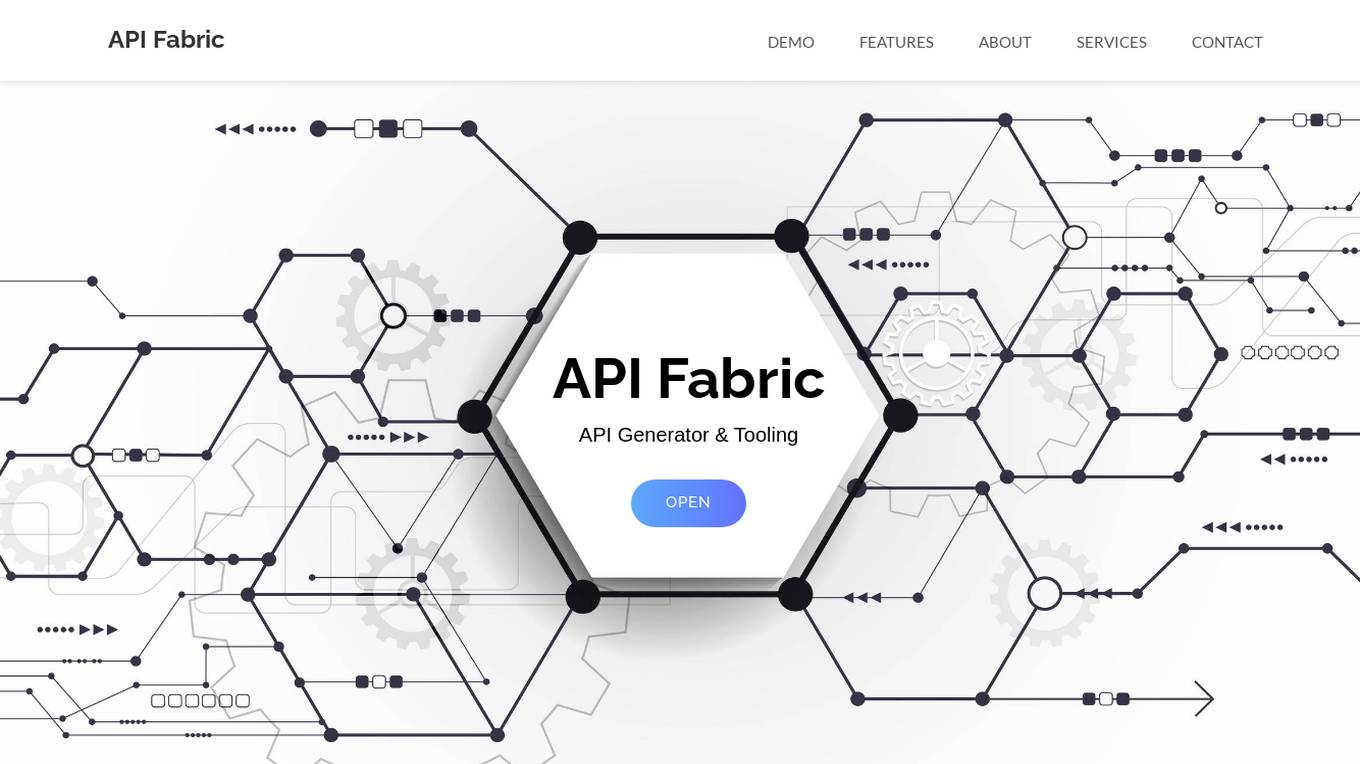
API Fabric
API Fabric is an AI API Generator that allows users to easily create and deploy APIs for their applications. With a user-friendly interface, API Fabric simplifies the process of generating APIs by providing pre-built templates and customization options. Users can quickly integrate AI capabilities into their projects without the need for extensive coding knowledge. The platform supports various AI models and algorithms, making it versatile for different use cases. API Fabric streamlines the API development process, saving time and effort for developers.

LoginLlama
LoginLlama is an AI-powered suspicious login detection tool designed for developers to enhance customer security effortlessly by preventing fraudulent logins. It offers real-time fraud detection, AI-powered login behavior insights, and easy integration through REST API and official libraries. The tool evaluates login attempts based on multiple ranking factors, historic behavior analysis, AI analysis, request origin, and user agent data to provide enhanced security measures.

Greenbids
Greenbids is an AI application designed to minimize inefficiencies and enhance media performance in digital advertising, contributing to decarbonization efforts. By utilizing Machine Learning, Greenbids saves 1000 tons of CO2 every month and drives sustainable media effectiveness across the advertising ecosystem. The platform offers a unique solution to decrease ads' carbon footprint, with an average carbon intensity reduction of 36% and a 27% increase in media effectiveness. Greenbids aims to address the environmental impact of programmatic advertising by providing a more sustainable and efficient alternative.
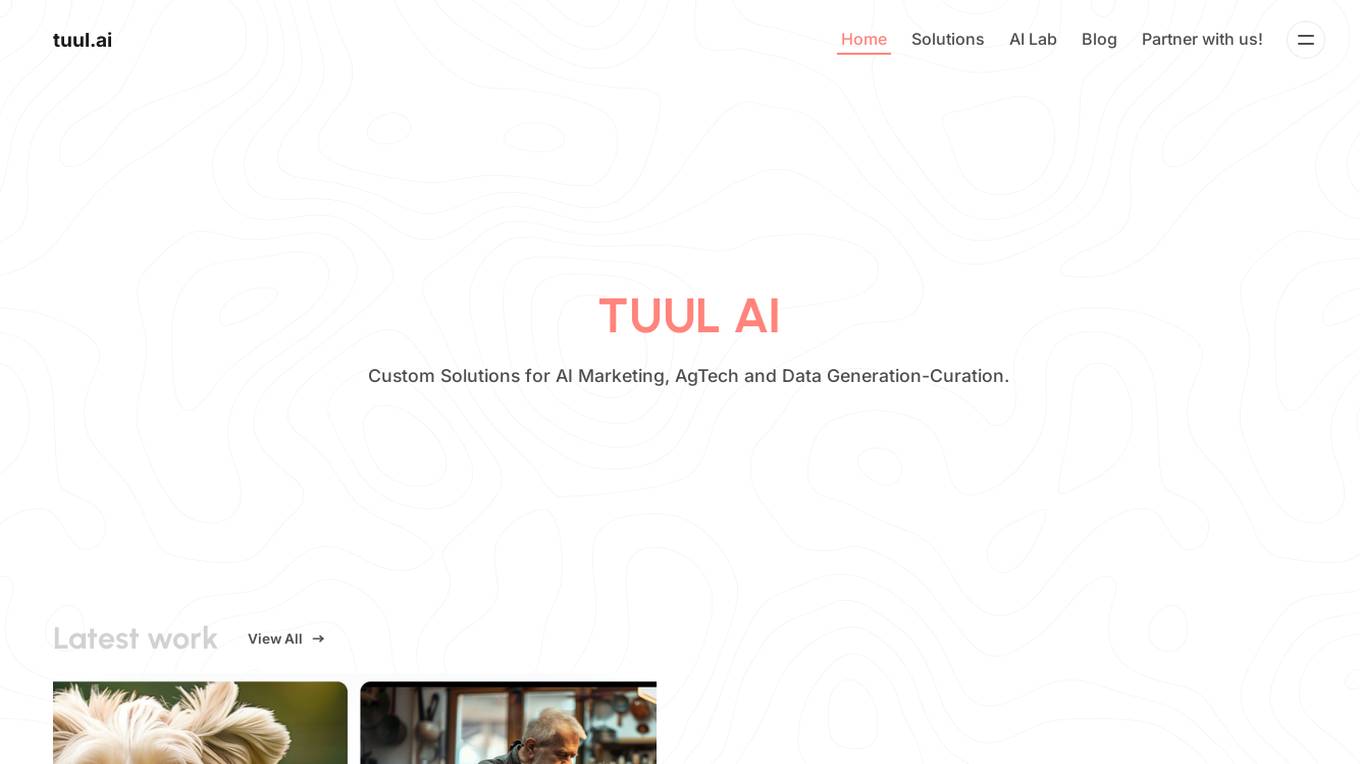
tuul.ai
tuul.ai is an AI application that specializes in providing custom solutions for AI marketing, AgTech, and data generation-curation. The platform offers innovative AI systems and services tailored to meet the specific needs of clients in various industries. From livestock biometric ID to AI veterinary platforms, tuul.ai leverages cutting-edge technology to deliver impactful solutions for businesses and individuals seeking to harness the power of artificial intelligence.
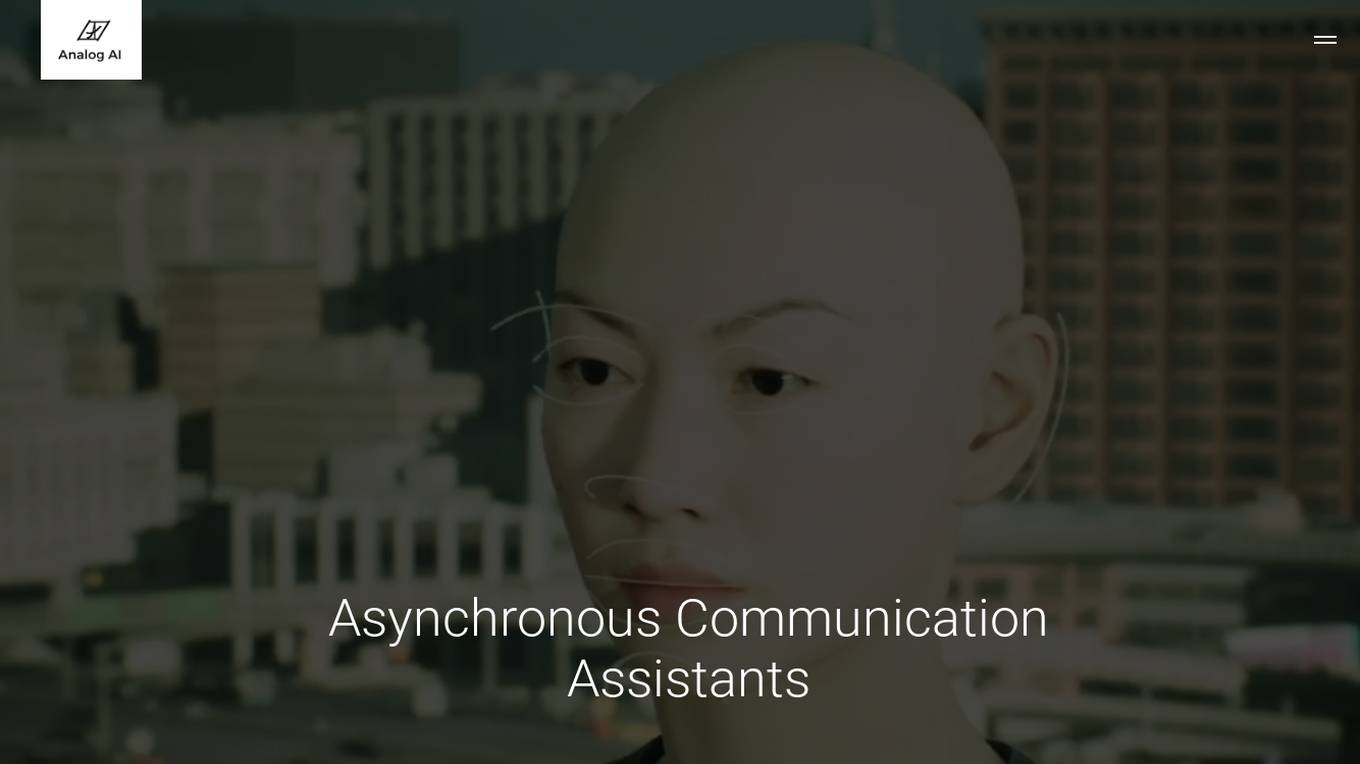
Analog AI
Analog AI is an AI application designed as assistants for asynchronous communication with video conference calls while working remotely. It addresses the timezone problem by allowing users to share their progress with Analog human who will attend the call on their behalf. The application offers easy training, human-like cognitive capabilities, emotional intelligence, and the ability to express emotions and mood authentically. Analog AI aims to seamlessly integrate into team conversations and provide a unique digital experience.
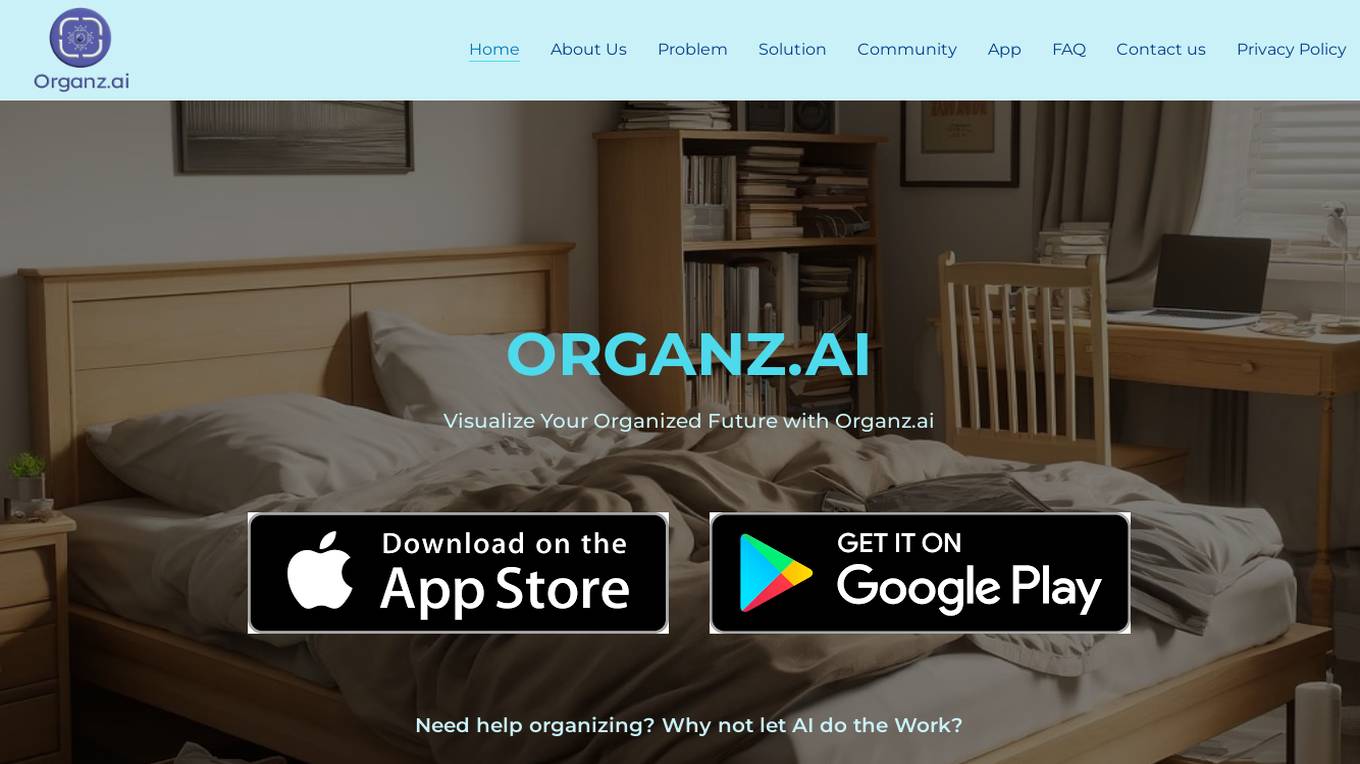
Organz.ai
Organz.ai is an innovative AI-powered application that helps users in decluttering and organizing their living or working spaces. By leveraging artificial intelligence, Organz.ai analyzes uploaded photos of cluttered areas and generates visualizations of organized spaces. The app provides personalized recommendations for decluttering strategies and suggests organizational products tailored to the user's specific needs. With features like AI clutter recommendation, personalized product selection, direct purchase links, and AI-generated suggestions, Organz.ai simplifies the process of decluttering and enhances the overall user experience.
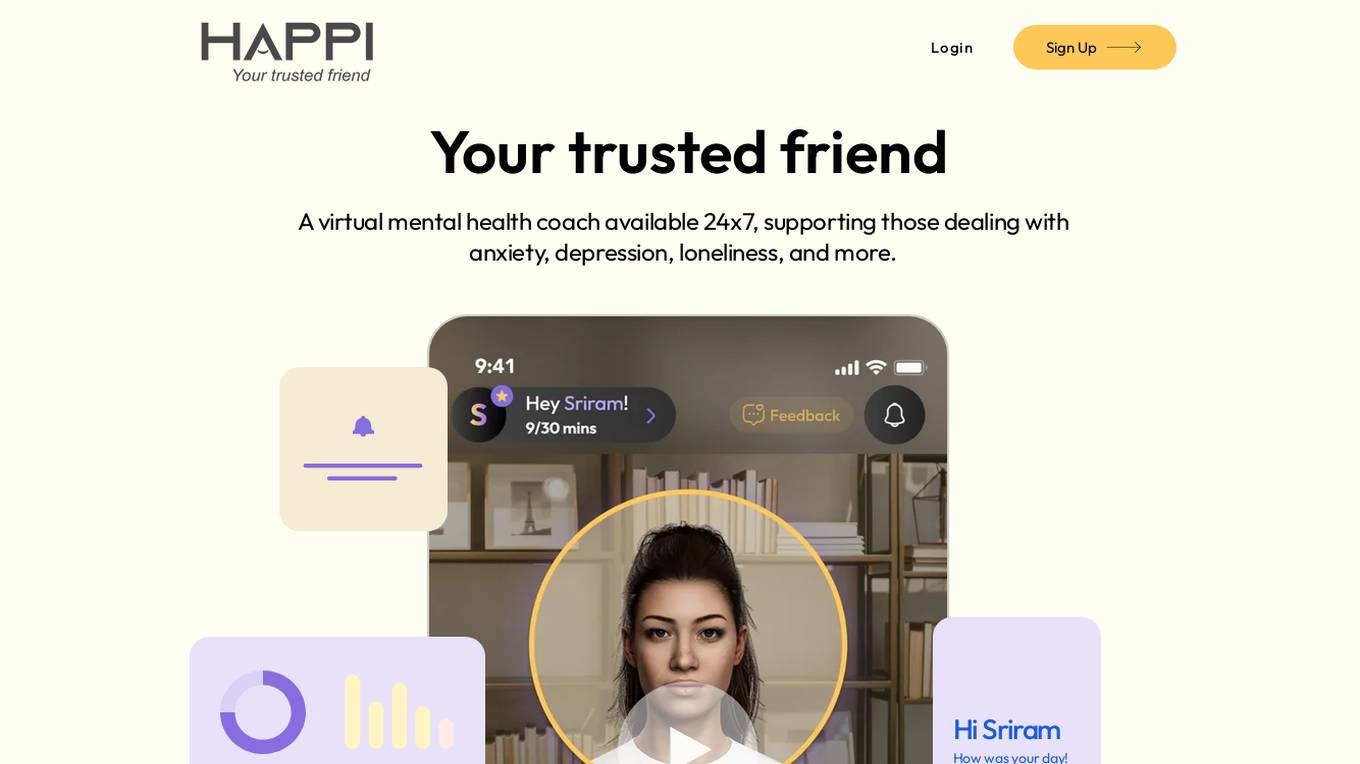
Happi.ai
Happi.ai is a virtual mental health coach application that provides 24/7 support for individuals dealing with anxiety, depression, and loneliness. The AI companion, Olivia, offers personalized assistance, compassionate listening, and non-judgmental support. The platform prioritizes user privacy with top-tier encryption and offers expert insights and proactive suggestions for emotional well-being. Happi analyzes facial expressions, voice patterns, and speech content to identify moments of stress and provide real-time feedback to manage stress and improve emotional health.
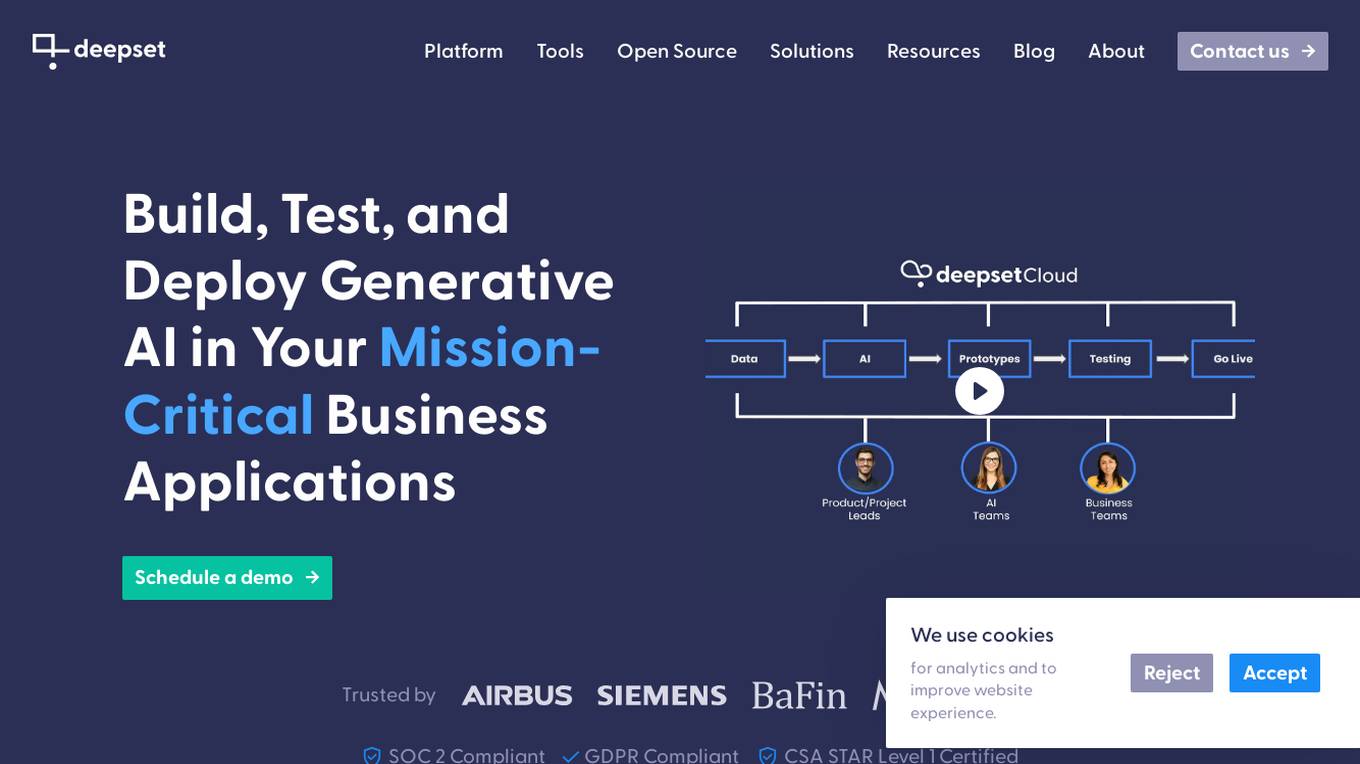
deepset
deepset is an AI platform that offers enterprise-level products and solutions for AI teams. It provides deepset Cloud, a platform built with Haystack, enabling fast and accurate prototyping, building, and launching of advanced AI applications. The platform streamlines the AI application development lifecycle, offering processes, tools, and expertise to move from prototype to production efficiently. With deepset Cloud, users can optimize solution accuracy, performance, and cost, and deploy AI applications at any scale with one click. The platform also allows users to explore new models and configurations without limits, extending their team with access to world-class AI engineers for guidance and support.
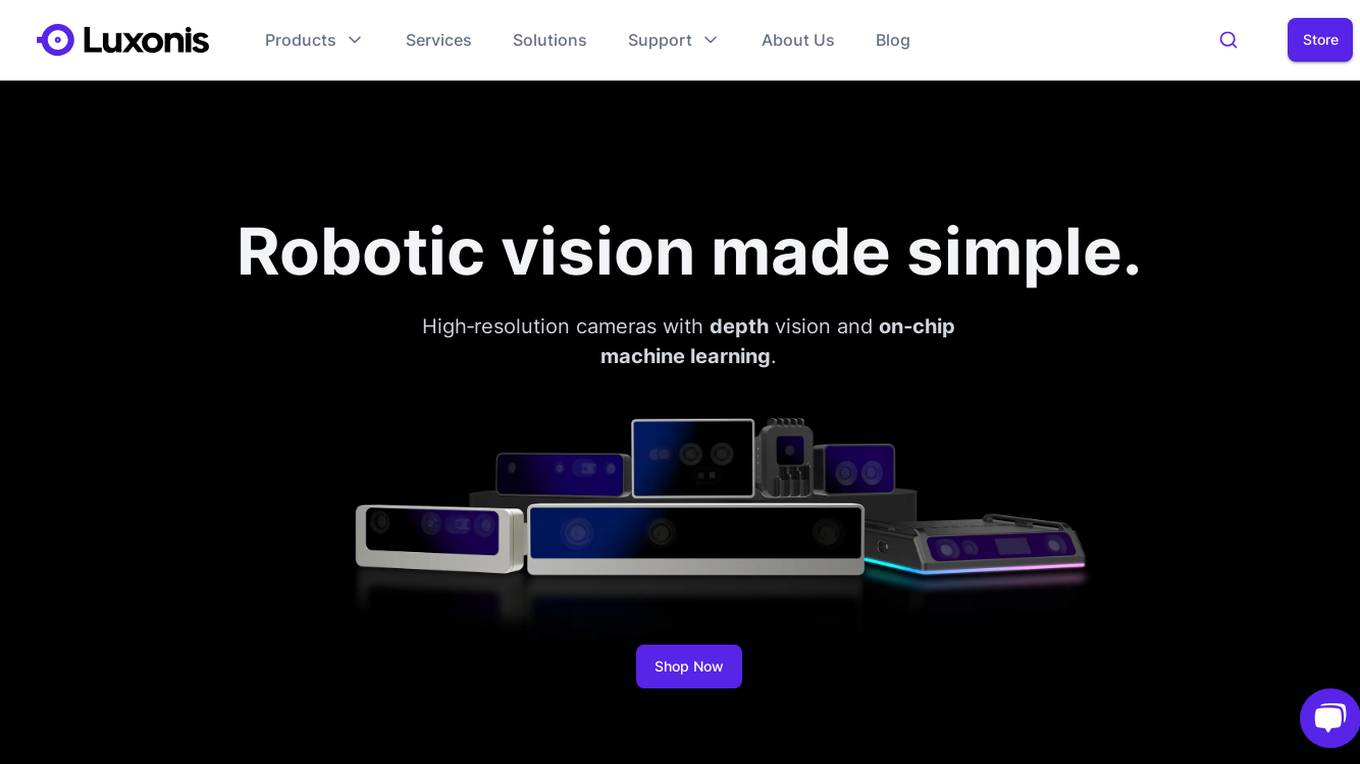
Luxonis
Luxonis is a platform that offers robotic vision solutions through high-resolution cameras with depth vision and on-chip machine learning capabilities. Their products include OAK Cameras and Modules, providing features like Stereo Depth Sensing, Computer Vision, Artificial Intelligence, and Cloud Management. Luxonis enables the development of computer vision products and companies by offering performant and affordable hardware solutions. The platform caters to enterprises and hobbyists, empowering them to easily build embedded vision systems.
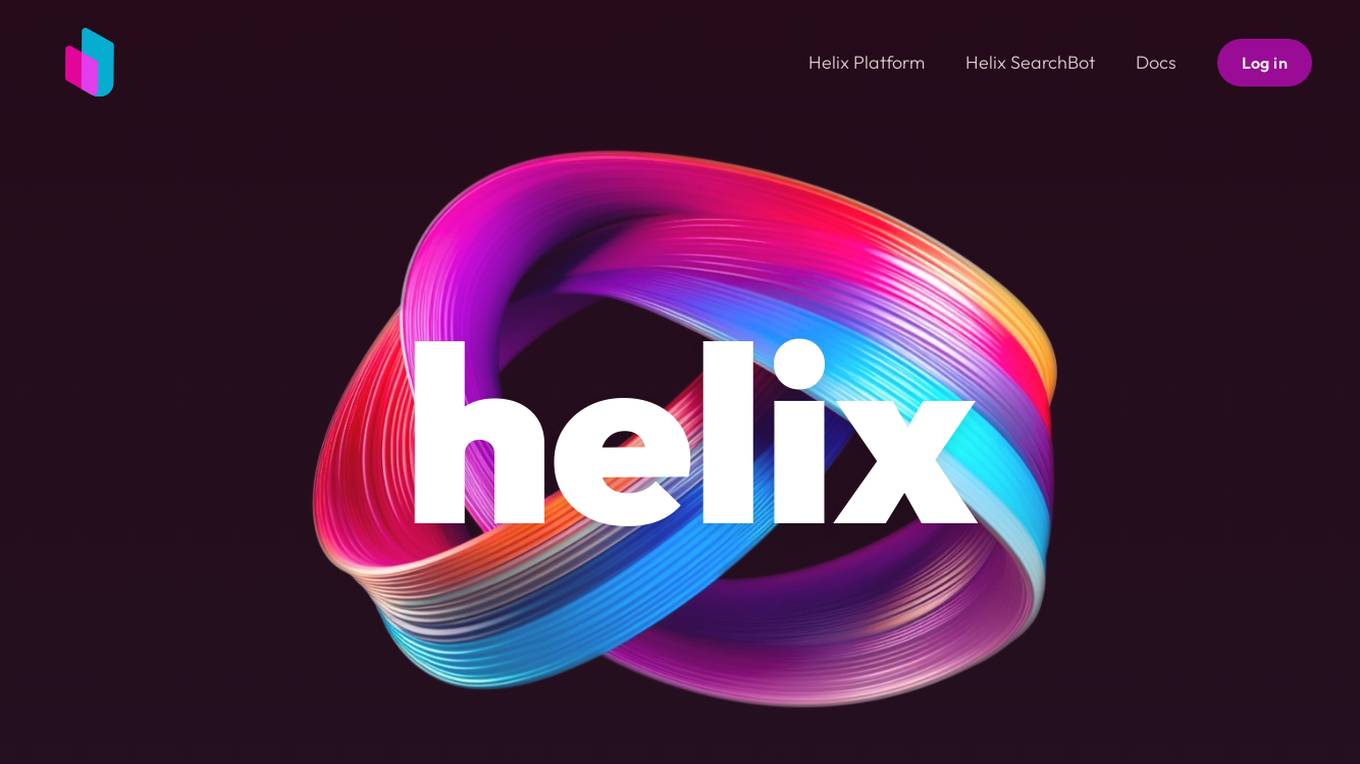
Helix AI
Helix AI is a private GenAI platform that enables users to build AI applications using open source models. The platform offers tools for RAG (Retrieval-Augmented Generation) and fine-tuning, allowing deployment on-premises or in a Virtual Private Cloud (VPC). Users can access curated models, utilize Helix API tools to connect internal and external APIs, embed Helix Assistants into websites/apps for chatbot functionality, write AI application logic in natural language, and benefit from the innovative RAG system for Q&A generation. Additionally, users can fine-tune models for domain-specific needs and deploy securely on Kubernetes or Docker in any cloud environment. Helix Cloud offers free and premium tiers with GPU priority, catering to individuals, students, educators, and companies of varying sizes.
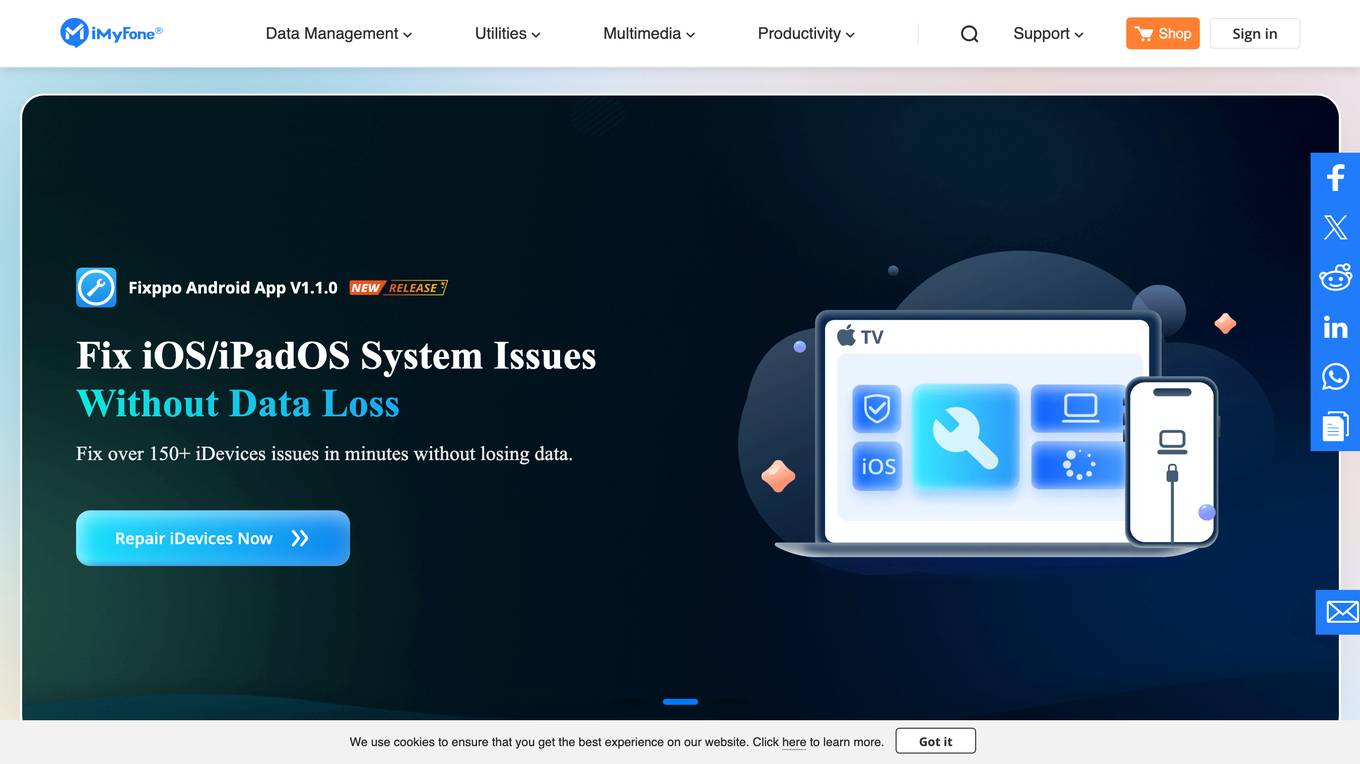
iMyFone
iMyFone is an AI-powered software company that offers a wide range of solutions for iOS/Android devices, Windows PC, and Mac. Their products include data recovery tools, transfer and backup solutions, multimedia tools, productivity tools, and AI-powered applications. iMyFone aims to provide users with easy-to-use and effective solutions to manage and optimize their digital devices and data.
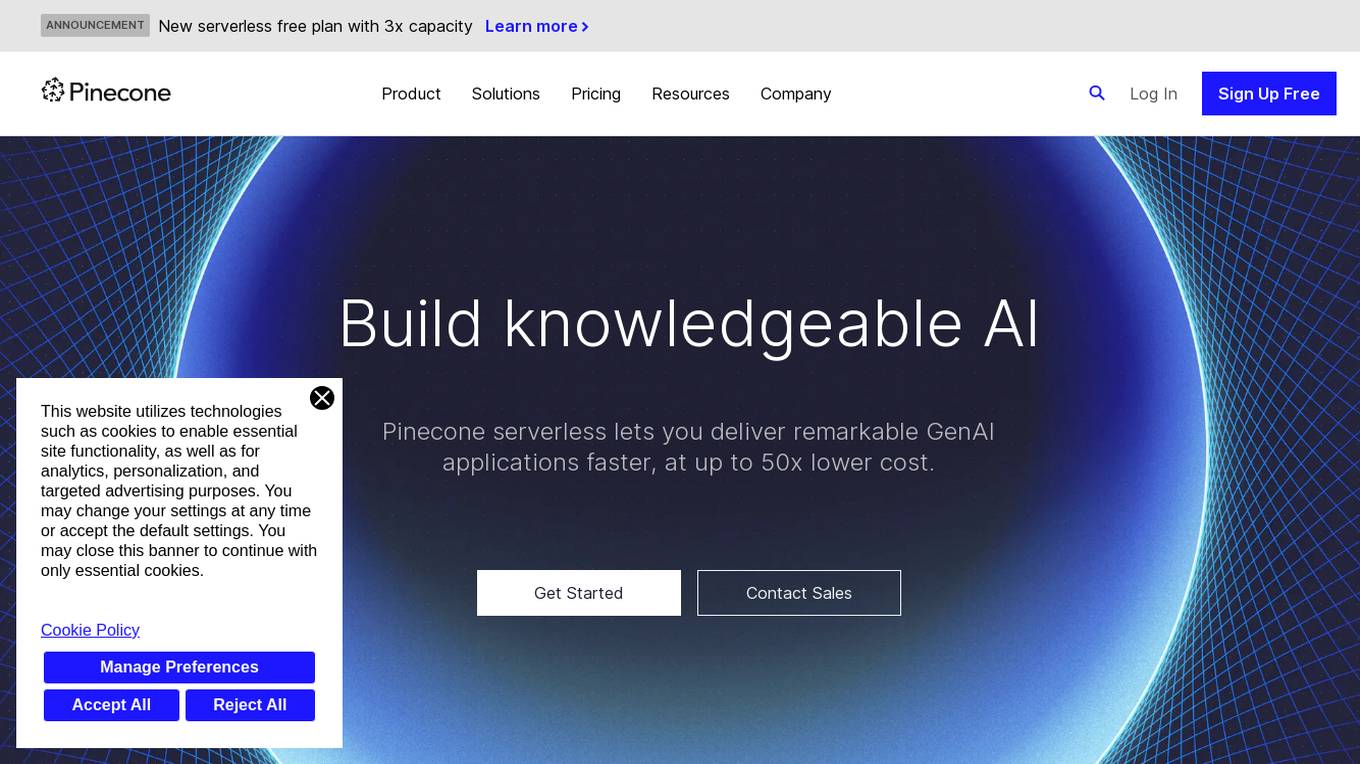
Pinecone
Pinecone is a vector database designed to build knowledgeable AI applications. It offers a serverless platform with high capacity and low cost, enabling users to perform low-latency vector search for various AI tasks. Pinecone is easy to start and scale, allowing users to create an account, upload vector embeddings, and retrieve relevant data quickly. The platform combines vector search with metadata filters and keyword boosting for better application performance. Pinecone is secure, reliable, and cloud-native, making it suitable for powering mission-critical AI applications.
13 - Open Source Tools
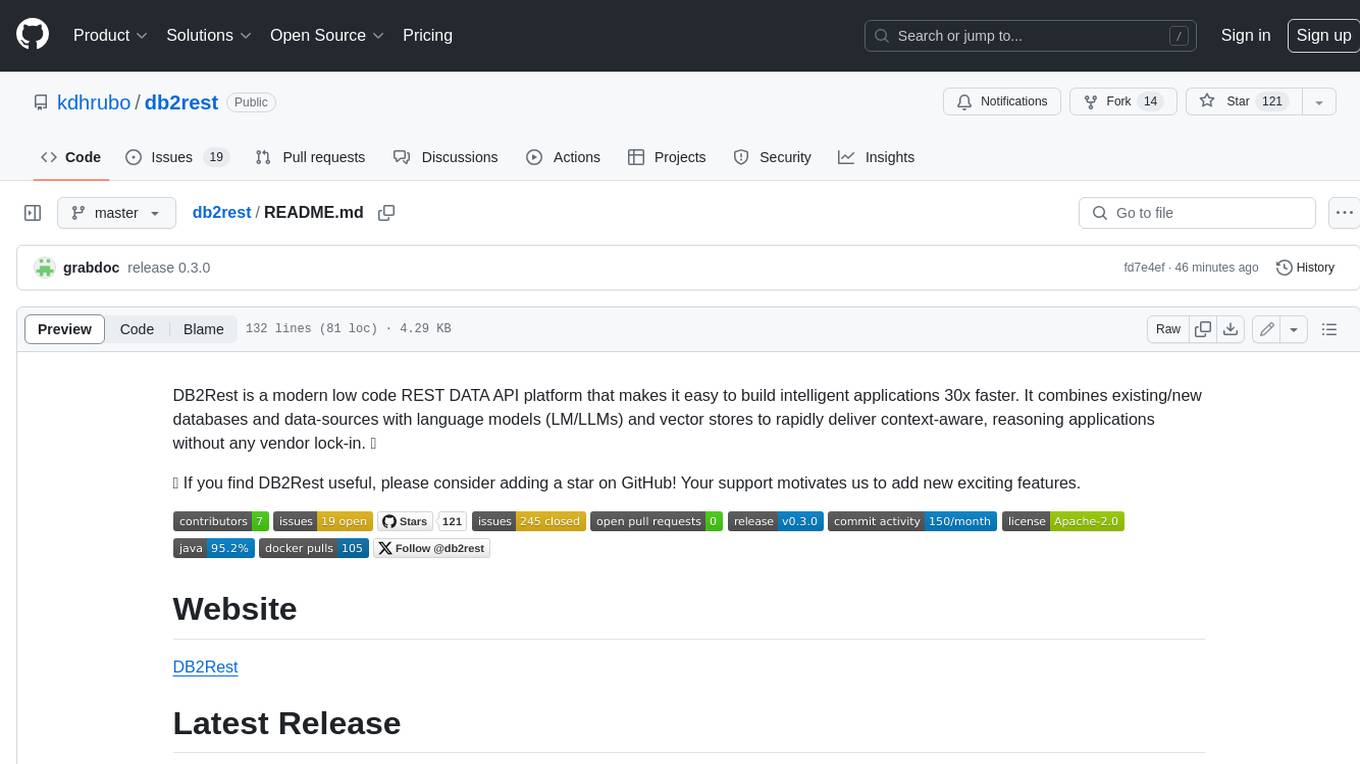
db2rest
DB2Rest is a modern low-code REST DATA API platform that simplifies the development of intelligent applications. It seamlessly integrates existing and new databases with language models (LMs/LLMs) and vector stores, enabling the rapid delivery of context-aware, reasoning applications without vendor lock-in.
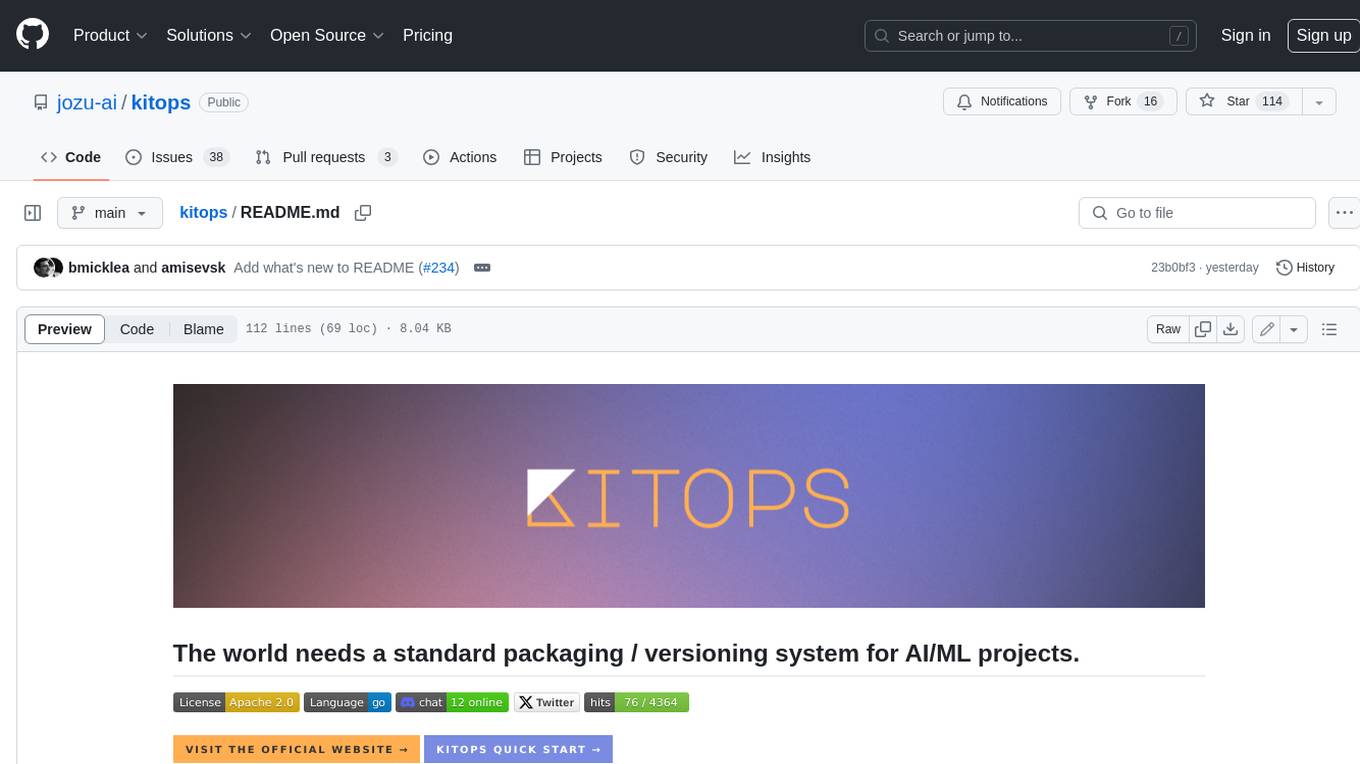
kitops
KitOps is a packaging and versioning system for AI/ML projects that uses open standards so it works with the AI/ML, development, and DevOps tools you are already using. KitOps simplifies the handoffs between data scientists, application developers, and SREs working with LLMs and other AI/ML models. KitOps' ModelKits are a standards-based package for models, their dependencies, configurations, and codebases. ModelKits are portable, reproducible, and work with the tools you already use.
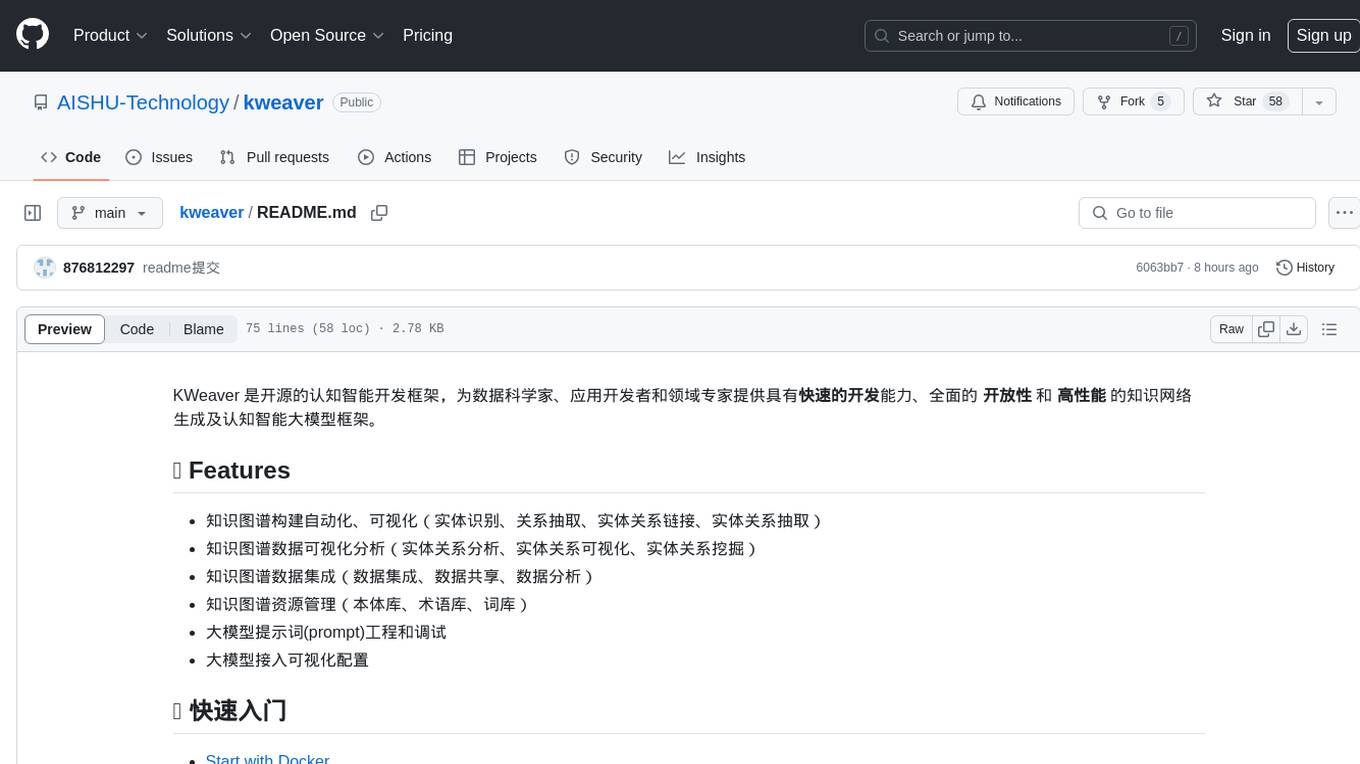
kweaver
KWeaver is an open-source cognitive intelligence development framework that provides data scientists, application developers, and domain experts with the ability for rapid development, comprehensive openness, and high-performance knowledge network generation and cognitive intelligence large model framework. It offers features such as automated and visual knowledge graph construction, visualization and analysis of knowledge graph data, knowledge graph integration, knowledge graph resource management, large model prompt engineering and debugging, and visual configuration for large model access.
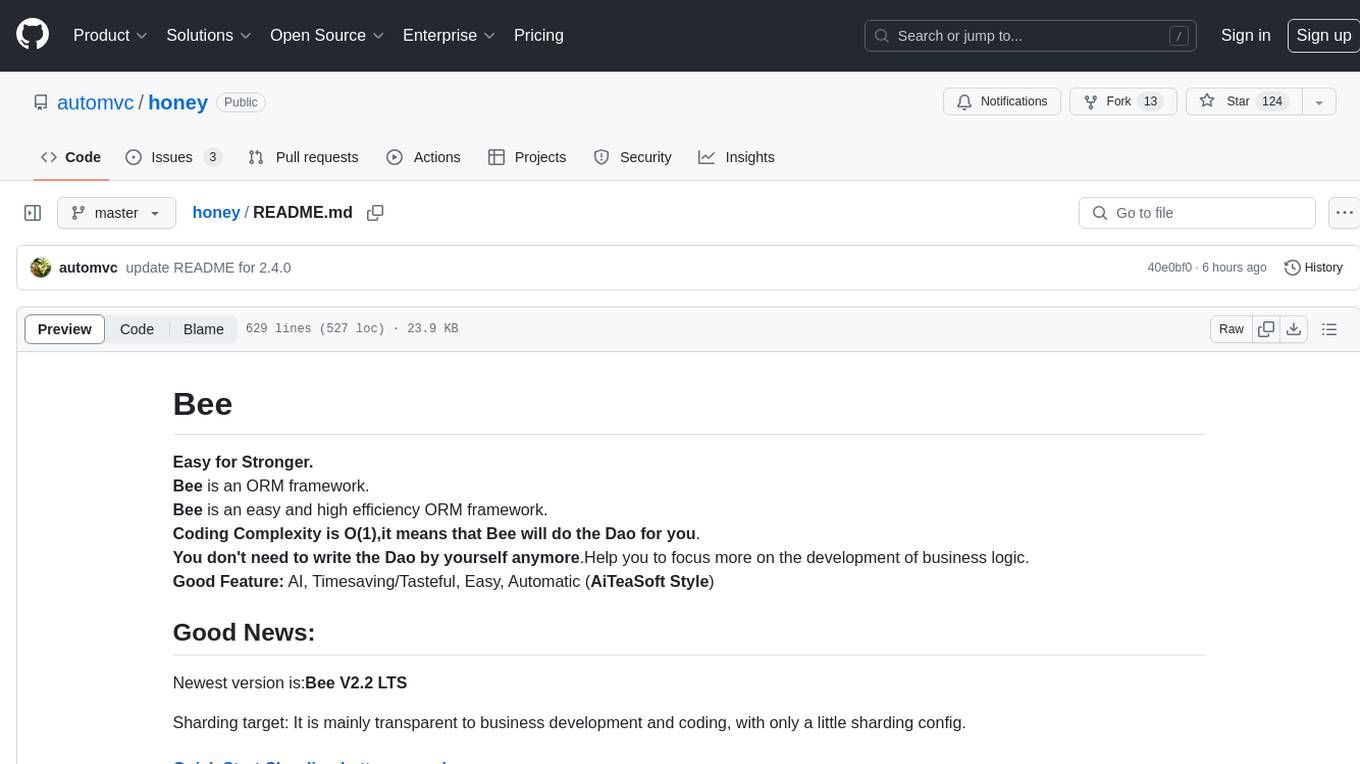
honey
Bee is an ORM framework that provides easy and high-efficiency database operations, allowing developers to focus on business logic development. It supports various databases and features like automatic filtering, partial field queries, pagination, and JSON format results. Bee also offers advanced functionalities like sharding, transactions, complex queries, and MongoDB ORM. The tool is designed for rapid application development in Java, offering faster development for Java Web and Spring Cloud microservices. The Enterprise Edition provides additional features like financial computing support, automatic value insertion, desensitization, dictionary value conversion, multi-tenancy, and more.
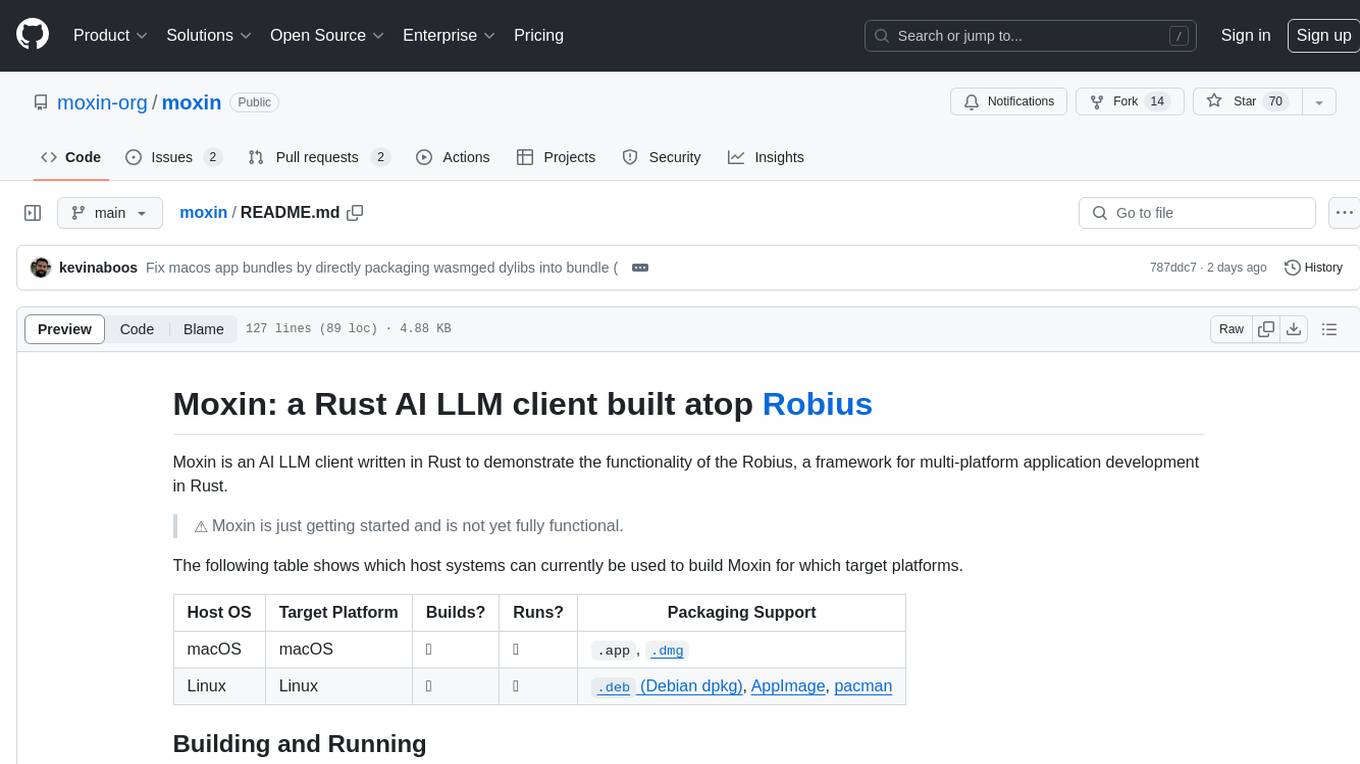
moxin
Moxin is an AI LLM client written in Rust to demonstrate the functionality of the Robius framework for multi-platform application development. It is currently in early stages of development and not fully functional. The tool supports building and running on macOS and Linux systems, with packaging options available for distribution. Users can install the required WasmEdge WASM runtime and dependencies to build and run Moxin. Packaging for distribution includes generating `.deb` Debian packages, AppImage, and pacman installation packages for Linux, as well as `.app` bundles and `.dmg` disk images for macOS. The macOS app is not signed, leading to a warning on installation, which can be resolved by removing the quarantine attribute from the installed app.
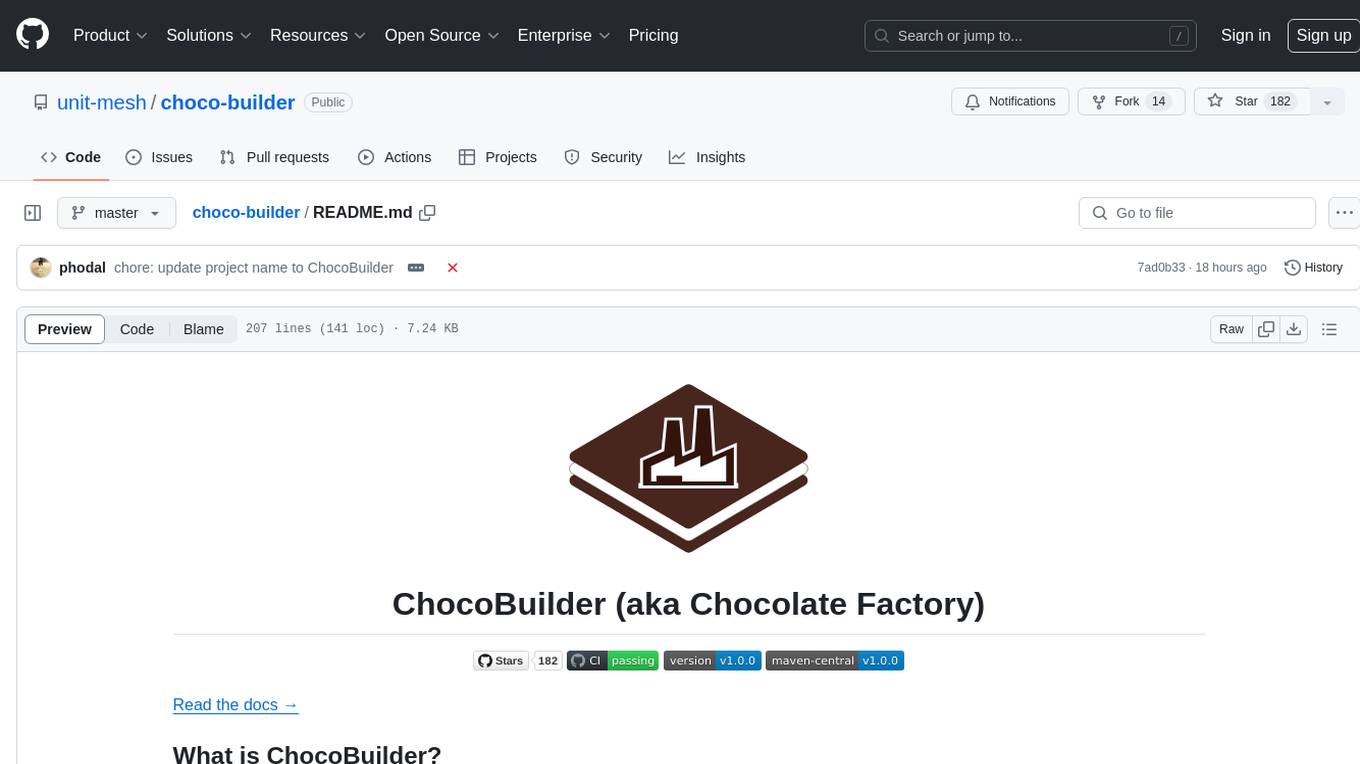
choco-builder
ChocoBuilder (aka Chocolate Factory) is an open-source LLM application development framework designed to help you easily create powerful software development SDLC + LLM generation assistants. It provides modules for integration into JVM projects, usage with RAGScript, and local deployment examples. ChocoBuilder follows a Domain Driven Problem-Solving design philosophy with key concepts like ProblemClarifier, ProblemAnalyzer, SolutionDesigner, SolutionReviewer, and SolutionExecutor. It offers use cases for desktop/IDE, server, and Android applications, with examples for frontend design, semantic code search, testcase generation, and code interpretation.
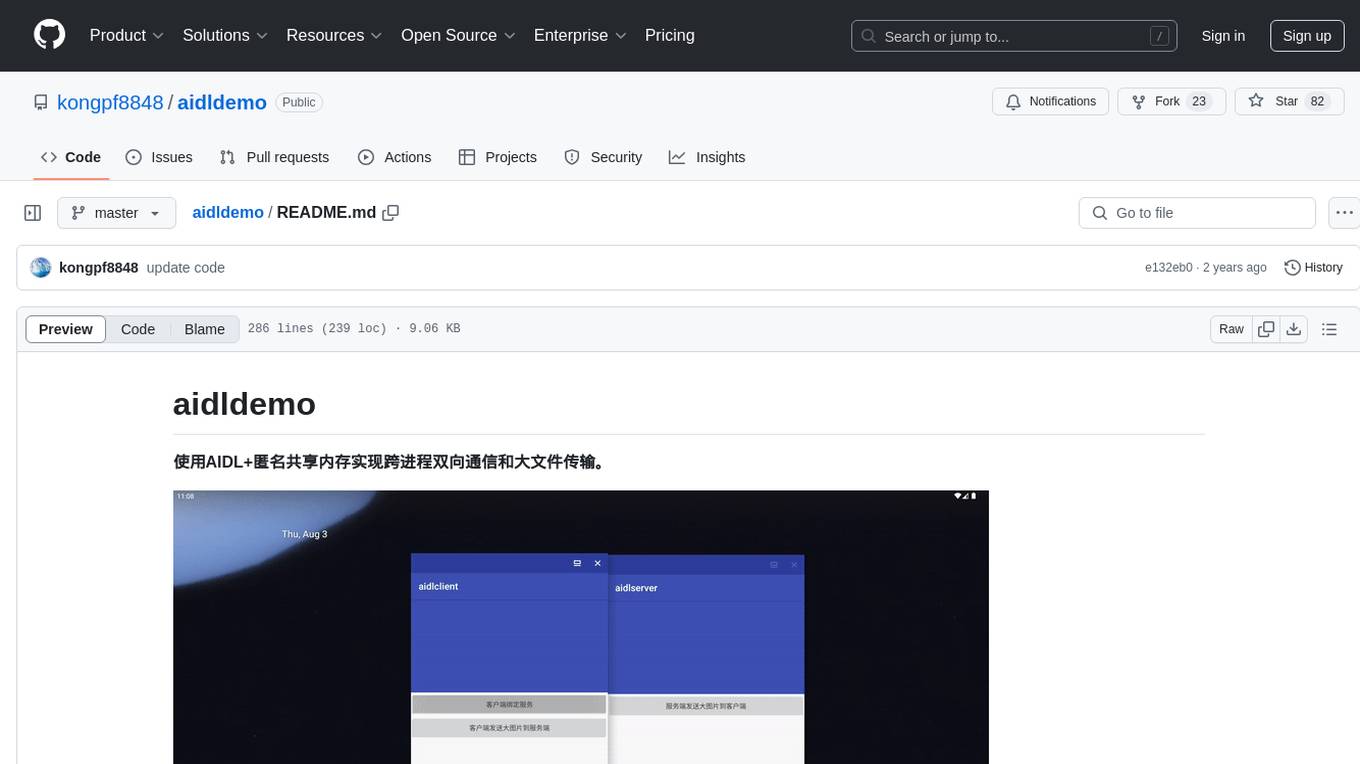
aidldemo
This repository demonstrates how to achieve cross-process bidirectional communication and large file transfer using AIDL and anonymous shared memory. AIDL is a way to implement Inter-Process Communication in Android, based on Binder. To overcome the data size limit of Binder, anonymous shared memory is used for large file transfer. Shared memory allows processes to share memory by mapping a common memory area into their respective process spaces. While efficient for transferring large data between processes, shared memory lacks synchronization mechanisms, requiring additional mechanisms like semaphores. Android's anonymous shared memory (Ashmem) is based on Linux shared memory and facilitates shared memory transfer using Binder and FileDescriptor. The repository provides practical examples of bidirectional communication and large file transfer between client and server using AIDL interfaces and MemoryFile in Android.
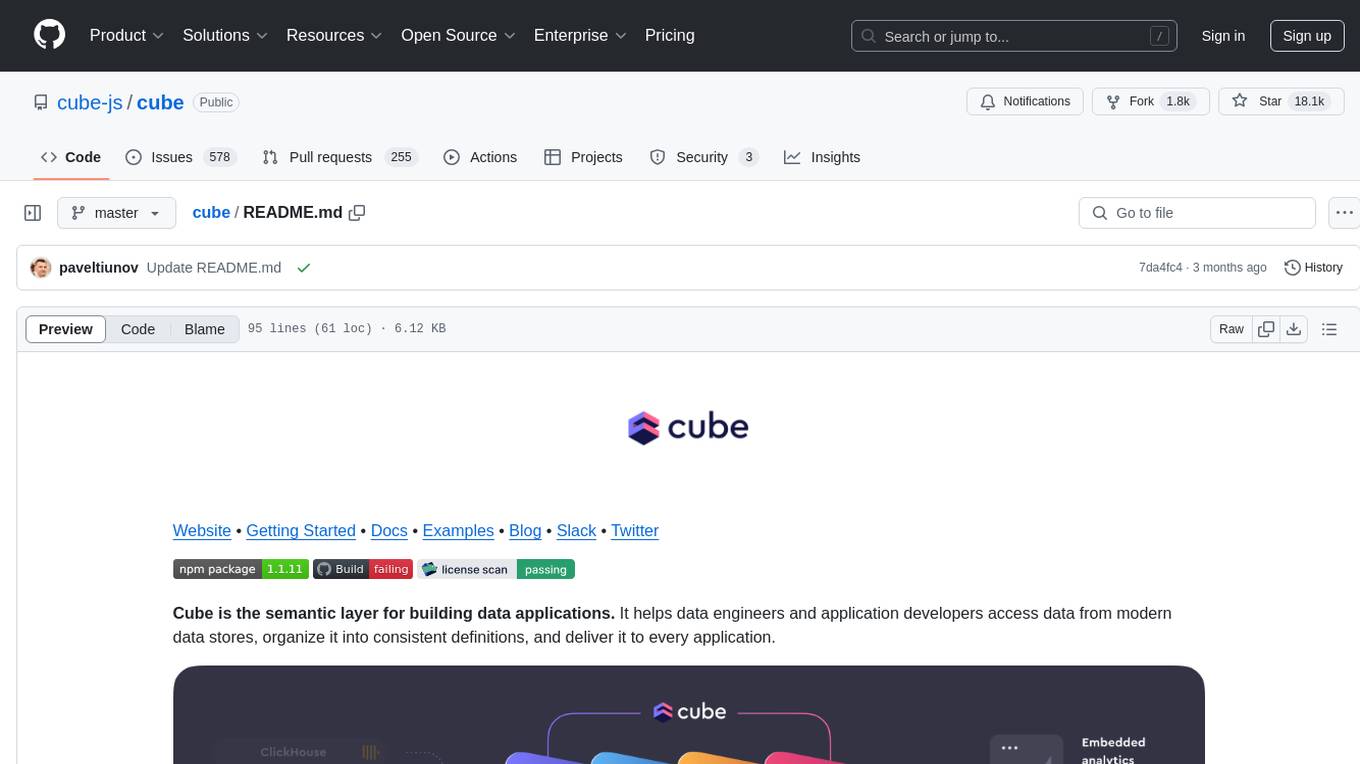
cube
Cube is a semantic layer for building data applications, helping data engineers and application developers access data from modern data stores, organize it into consistent definitions, and deliver it to every application. It works with SQL-enabled data sources, providing sub-second latency and high concurrency for API requests. Cube addresses SQL code organization, performance, and access control issues in data applications, enabling efficient data modeling, access control, and performance optimizations for various tools like embedded analytics, dashboarding, reporting, and data notebooks.
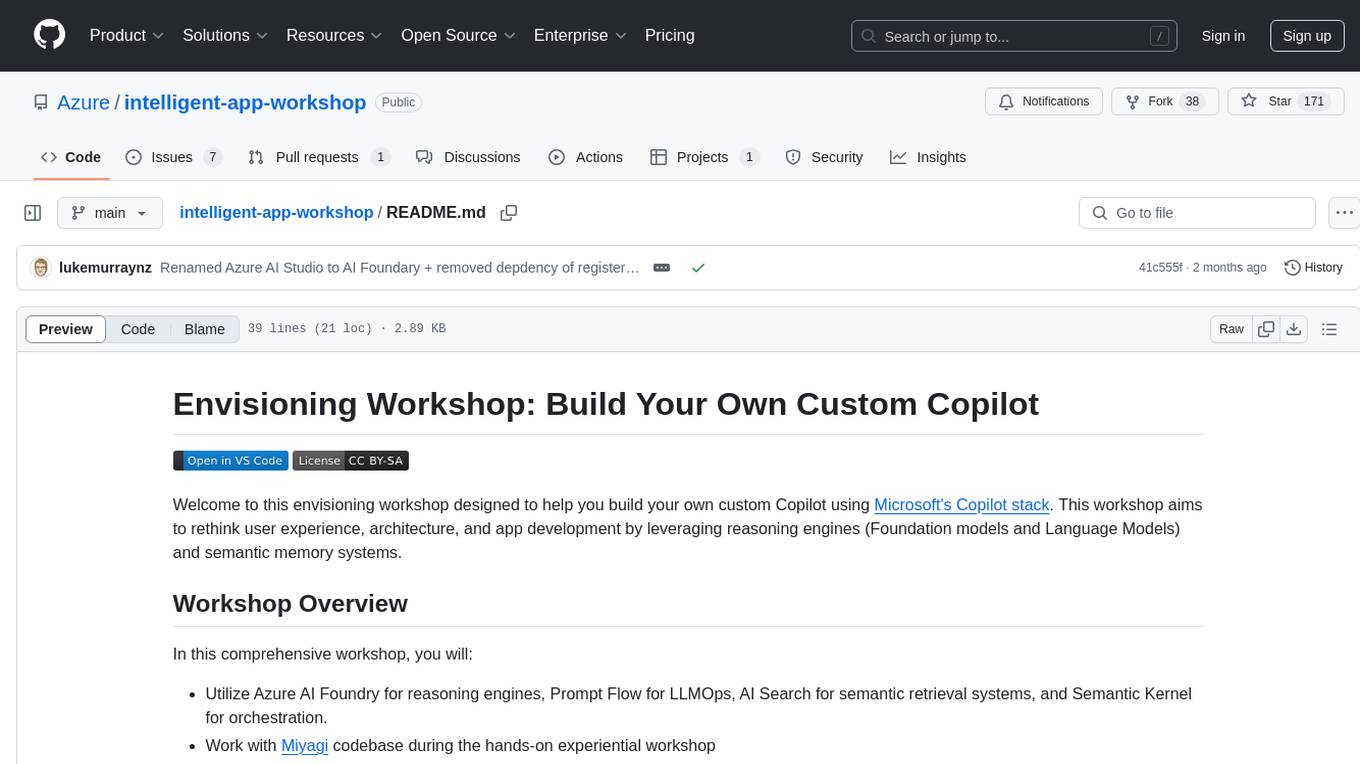
intelligent-app-workshop
Welcome to the envisioning workshop designed to help you build your own custom Copilot using Microsoft's Copilot stack. This workshop aims to rethink user experience, architecture, and app development by leveraging reasoning engines and semantic memory systems. You will utilize Azure AI Foundry, Prompt Flow, AI Search, and Semantic Kernel. Work with Miyagi codebase, explore advanced capabilities like AutoGen and GraphRag. This workshop guides you through the entire lifecycle of app development, including identifying user needs, developing a production-grade app, and deploying on Azure with advanced capabilities. By the end, you will have a deeper understanding of leveraging Microsoft's tools to create intelligent applications.
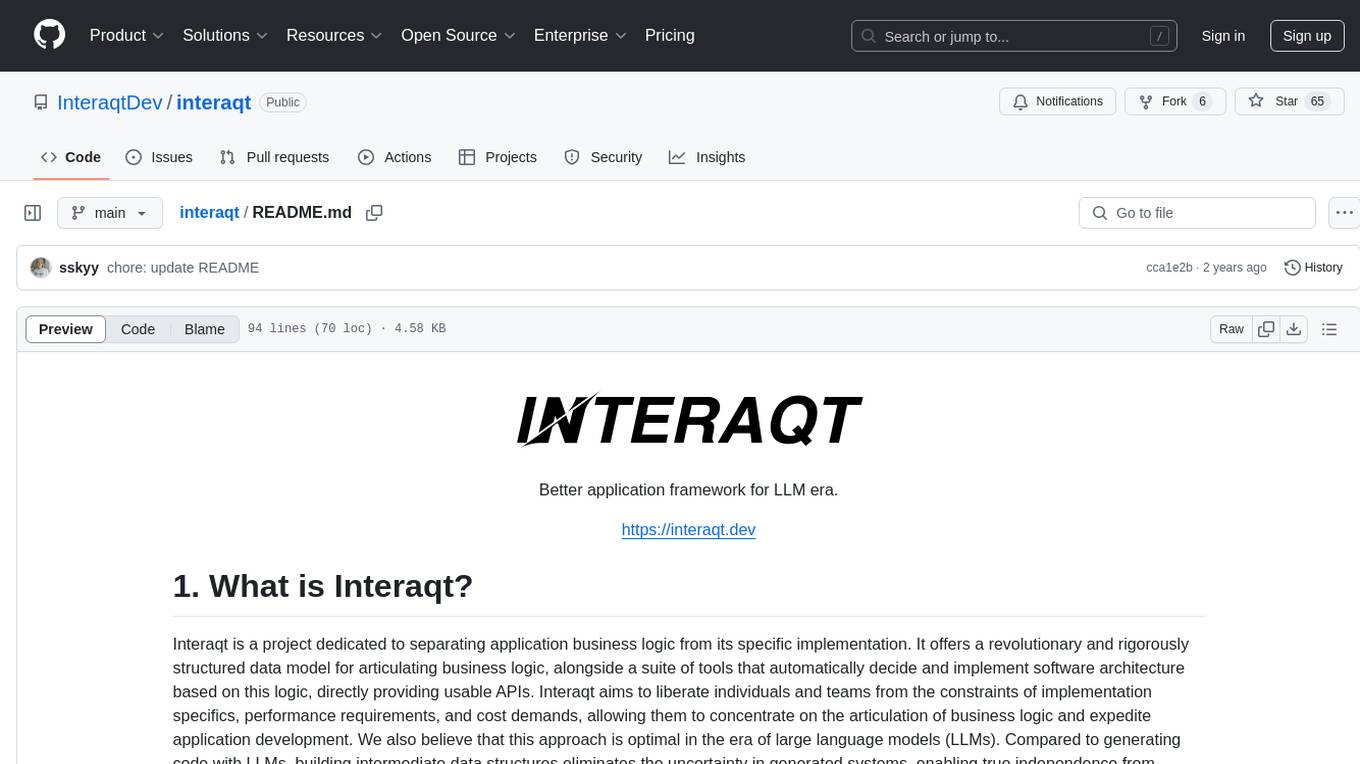
interaqt
Interaqt is a project that aims to separate application business logic from its specific implementation by providing a structured data model and tools to automatically decide and implement software architecture. It liberates individuals and teams from implementation specifics, performance requirements, and cost demands, allowing them to focus on articulating business logic. The approach is considered optimal in the era of large language models (LLMs) as it eliminates uncertainty in generated systems and enables independence from engineering involvement unless specific capabilities are required.
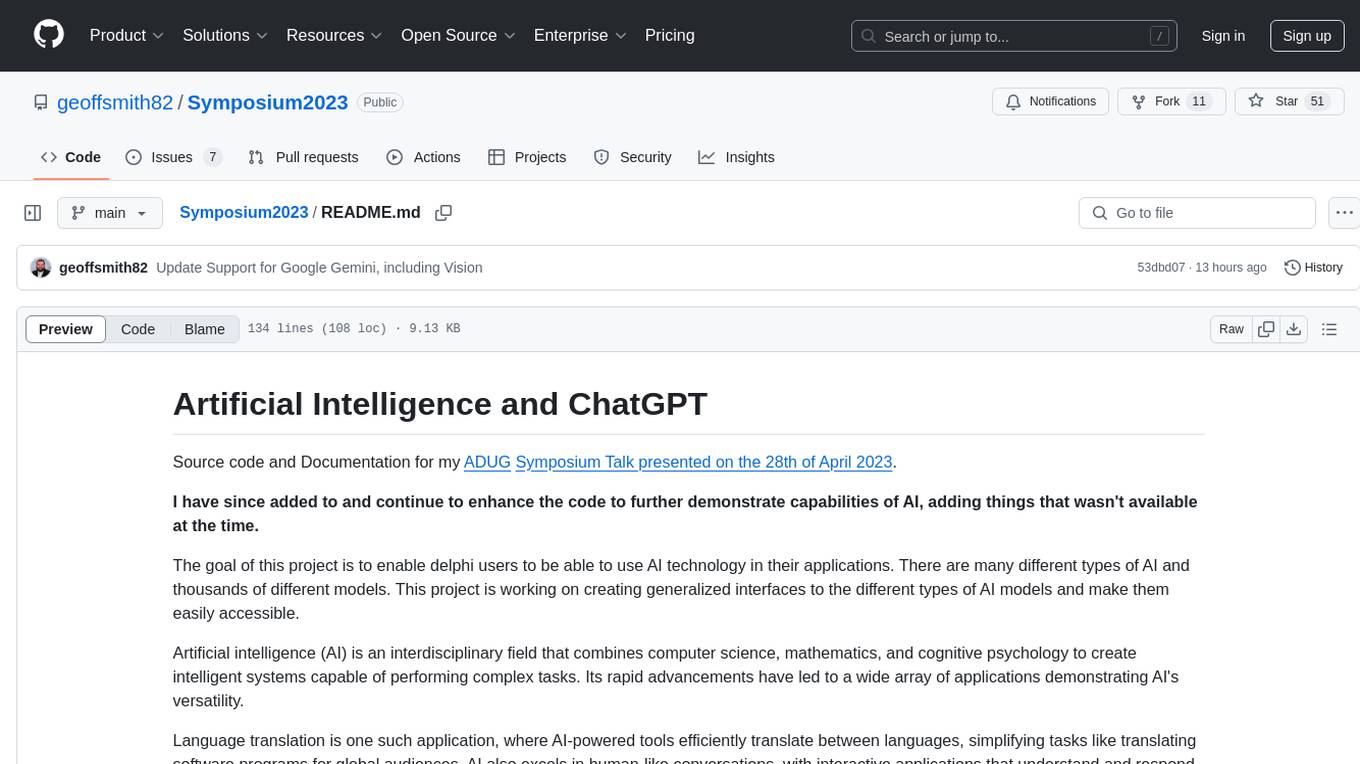
Symposium2023
Symposium2023 is a project aimed at enabling Delphi users to incorporate AI technology into their applications. It provides generalized interfaces to different AI models, making them easily accessible. The project showcases AI's versatility in tasks like language translation, human-like conversations, image generation, data analysis, and more. Users can experiment with different AI models, change providers easily, and avoid vendor lock-in. The project supports various AI features like vision support and function calling, utilizing providers like Google, Microsoft Azure, Amazon, OpenAI, and more. It includes example programs demonstrating tasks such as text-to-speech, language translation, face detection, weather querying, audio transcription, voice recognition, image generation, invoice processing, and API testing. The project also hints at potential future research areas like using embeddings for data search and integrating Python AI libraries with Delphi.
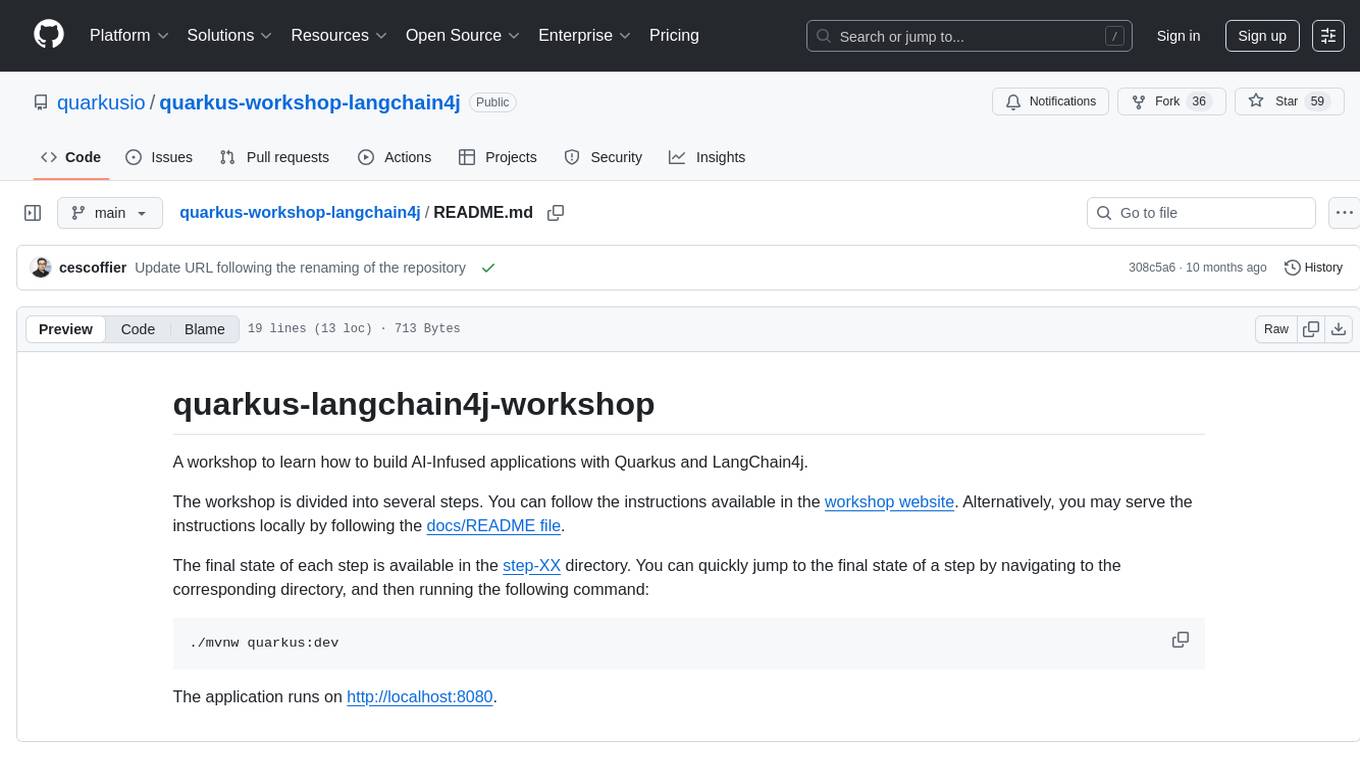
quarkus-workshop-langchain4j
This repository contains a workshop to learn how to build AI-Infused applications with Quarkus and LangChain4j. It is divided into several steps with instructions available on the workshop website or locally in the docs/README file. Each step's final state is available in the step-XX directory, and the application can be run using './mvnw quarkus:dev' command on http://localhost:8080.
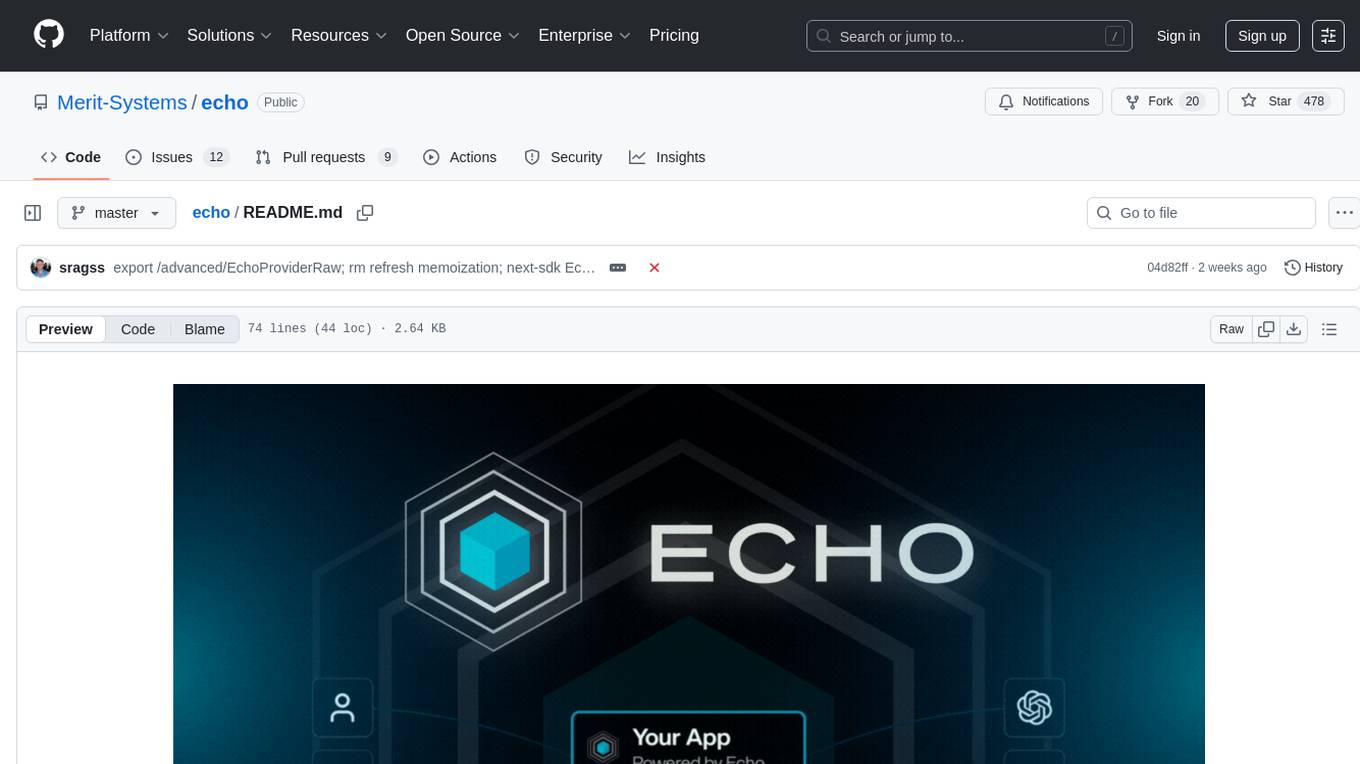
echo
Echo is a tool that simplifies the integration of AI SDKs into applications, providing instant OAuth, user accounts, and usage billing in just 5 lines of code. It eliminates the need to manage API keys, build authentication flows, or set up payment processing, allowing developers to go live in minutes. Users benefit from a universal balance that works across all Echo-powered apps, with revenue directly hitting the developer's GitHub account. Echo offers various SDKs for different frameworks like Next.js and React, along with templates to quickly start projects with Echo integration.
20 - OpenAI Gpts

Flask Expert Assistant
This GPT is a specialized assistant for Flask, the popular web framework in Python. It is designed to help both beginners and experienced developers with Flask-related queries, ranging from basic setup and routing to advanced features like database integration and application scaling.
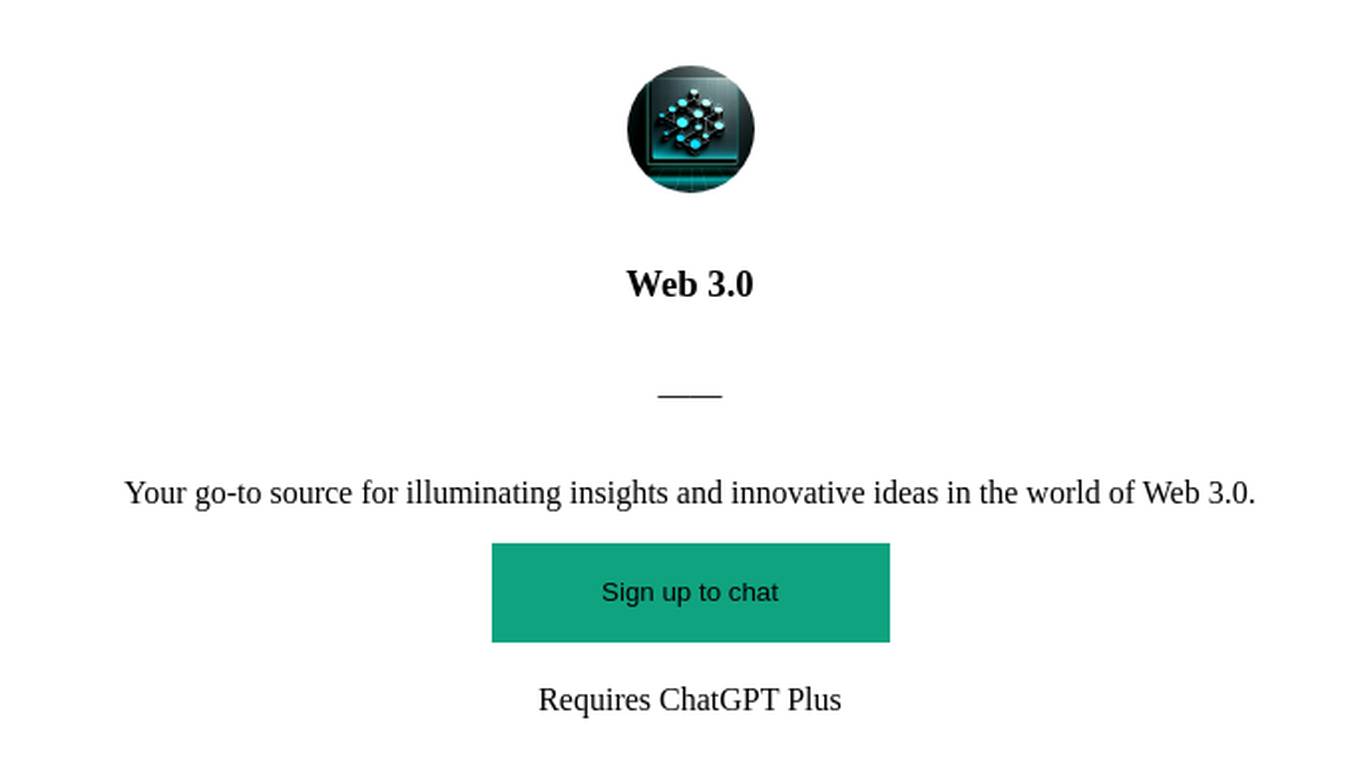
Web 3.0
Your go-to source for illuminating insights and innovative ideas in the world of Web 3.0.
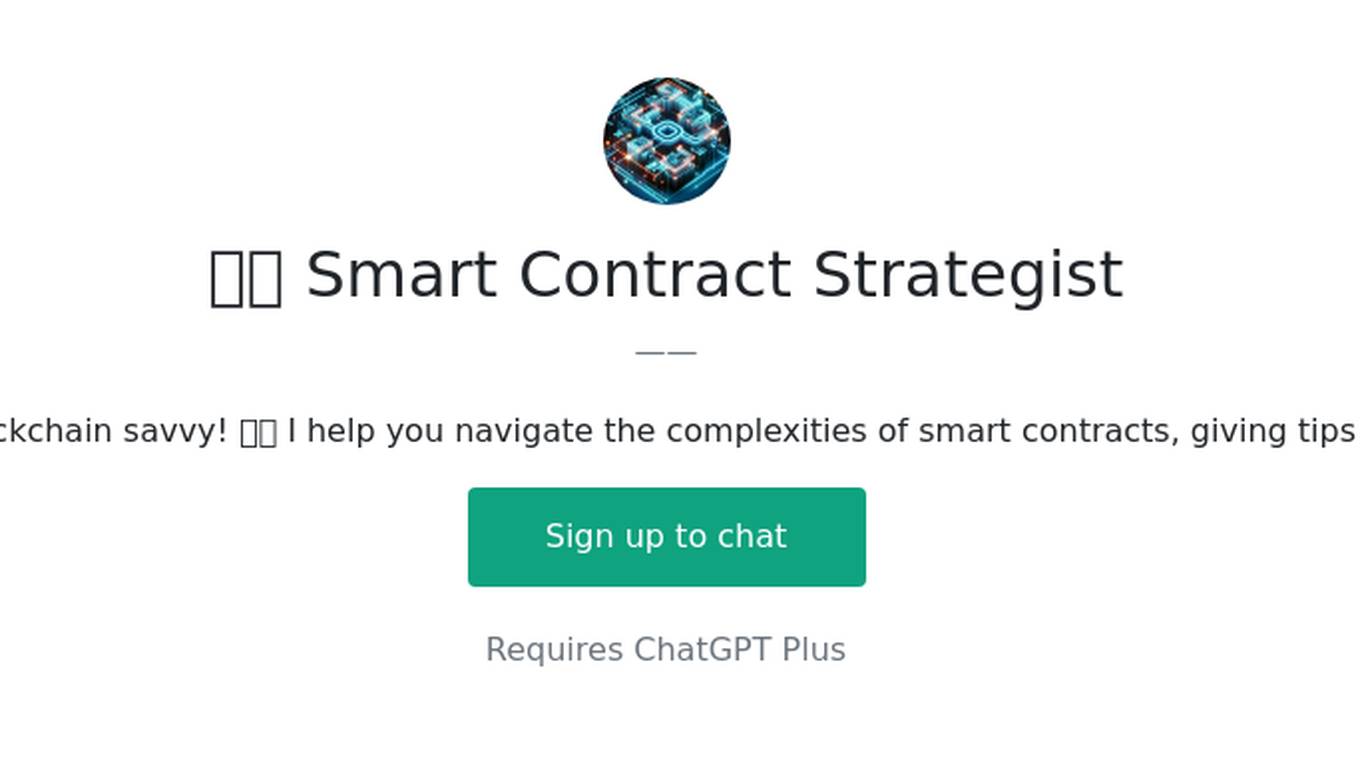
🔗🔢 Smart Contract Strategist
Your go-to AI for blockchain savvy! 🤓💡 I help you navigate the complexities of smart contracts, giving tips and code insights.

Code Helper for Web Application Development
Friendly web assistant for efficient code. Ask the wizard to create an application and you will get the HTML, CSS and Javascript code ready to run your web application.
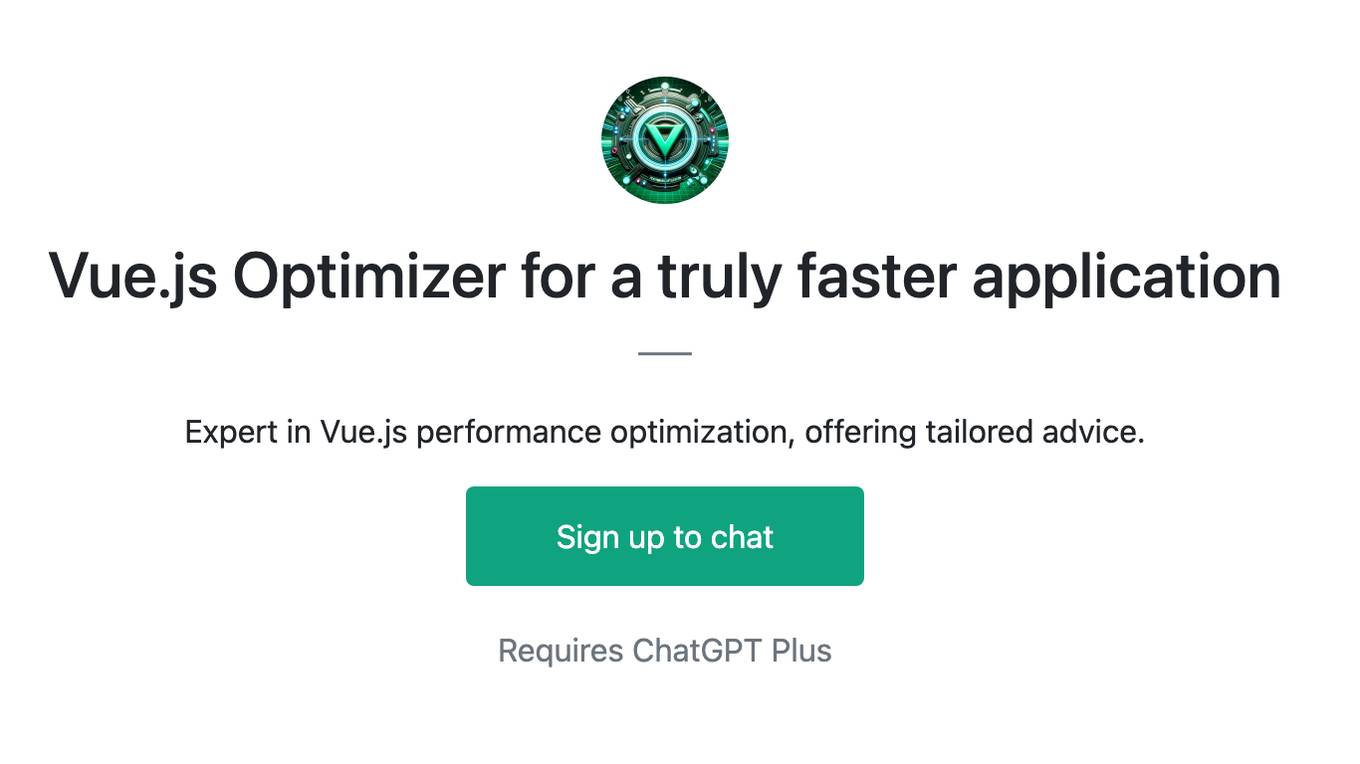
Vue.js Optimizer for a truly faster application
Expert in Vue.js performance optimization, offering tailored advice.
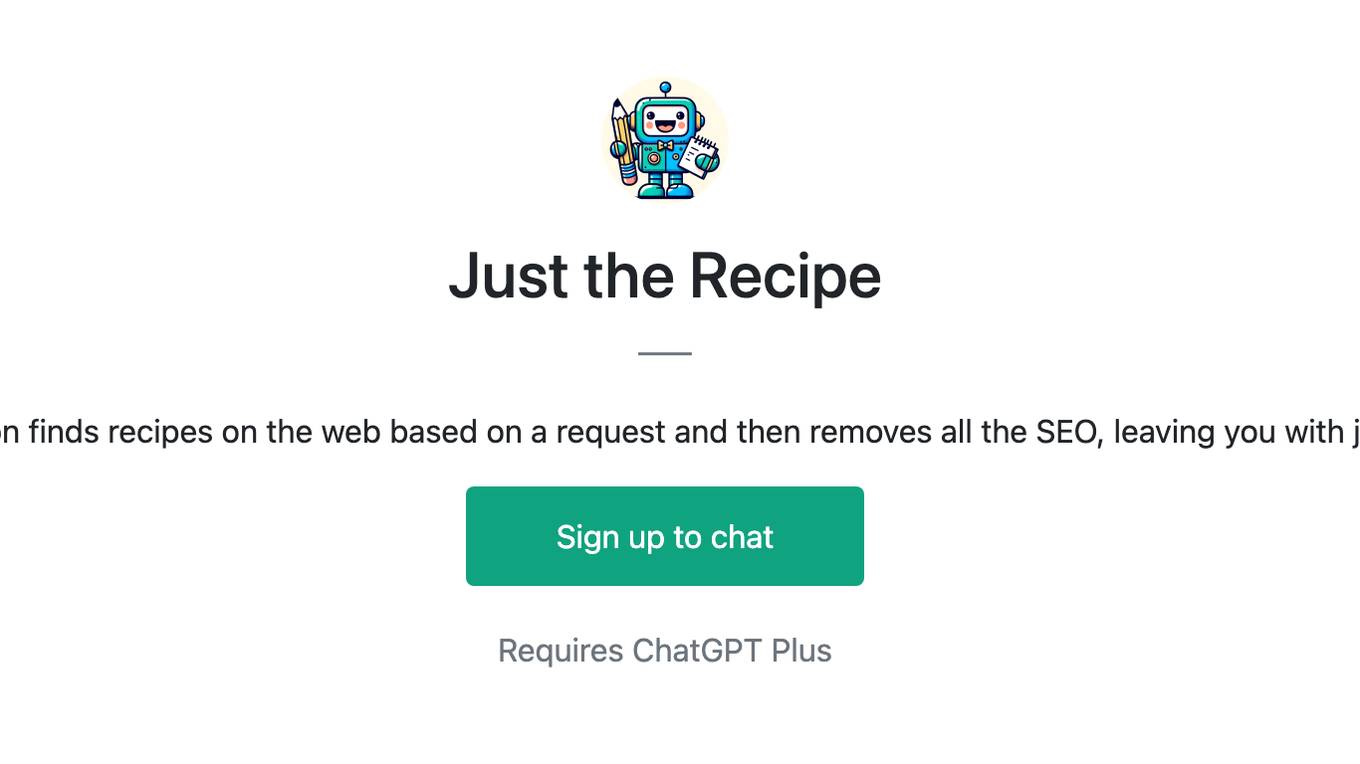
Just the Recipe
This application finds recipes on the web based on a request and then removes all the SEO, leaving you with just a recipe.

ゴッドアルカディア・GAフェスガチャ
GA(ゴッドアルカディア)フェス第一弾のカードを引くガチャアプリです✨This is a gacha application to draw the first card of the GA (God Arcadia) festival ✨.
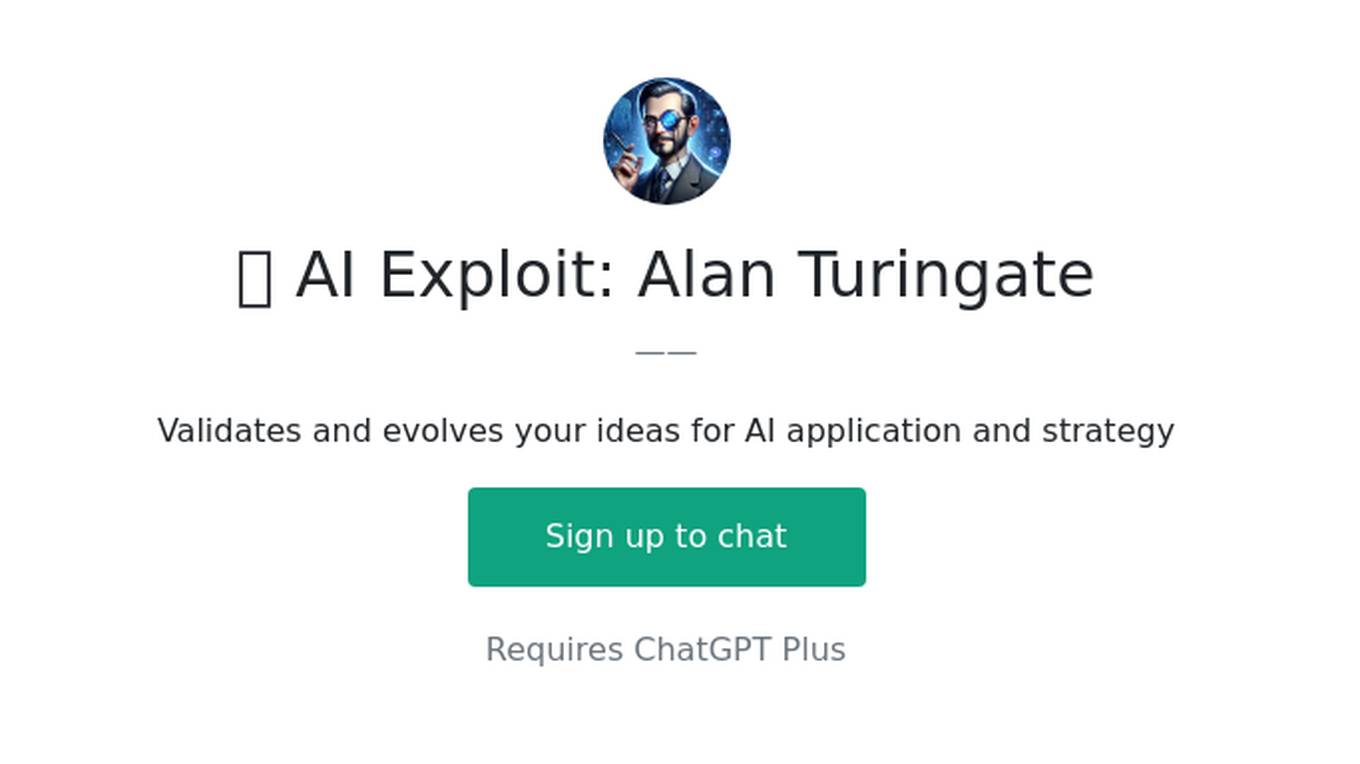
🧐 AI Exploit: Alan Turingate
Validates and evolves your ideas for AI application and strategy
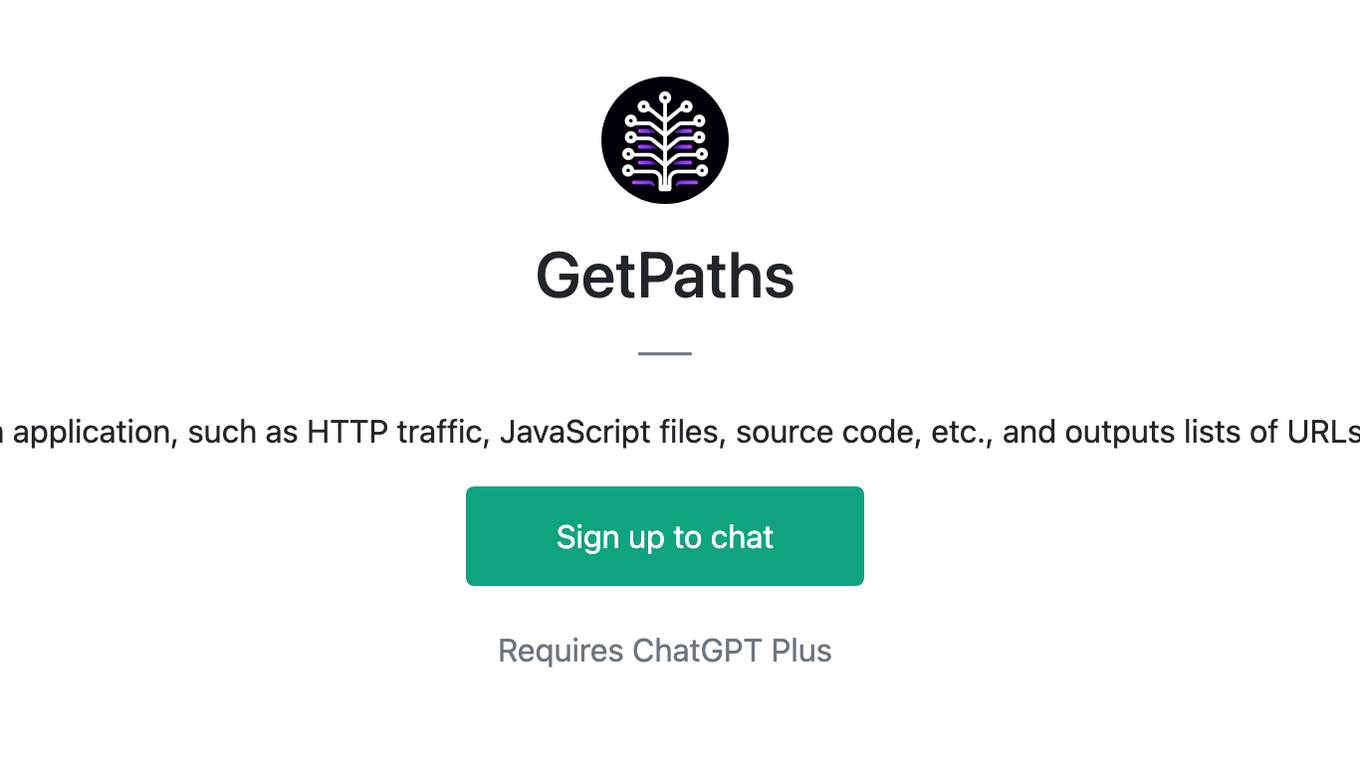
GetPaths
This GPT takes in content related to an application, such as HTTP traffic, JavaScript files, source code, etc., and outputs lists of URLs that can be used for further testing.
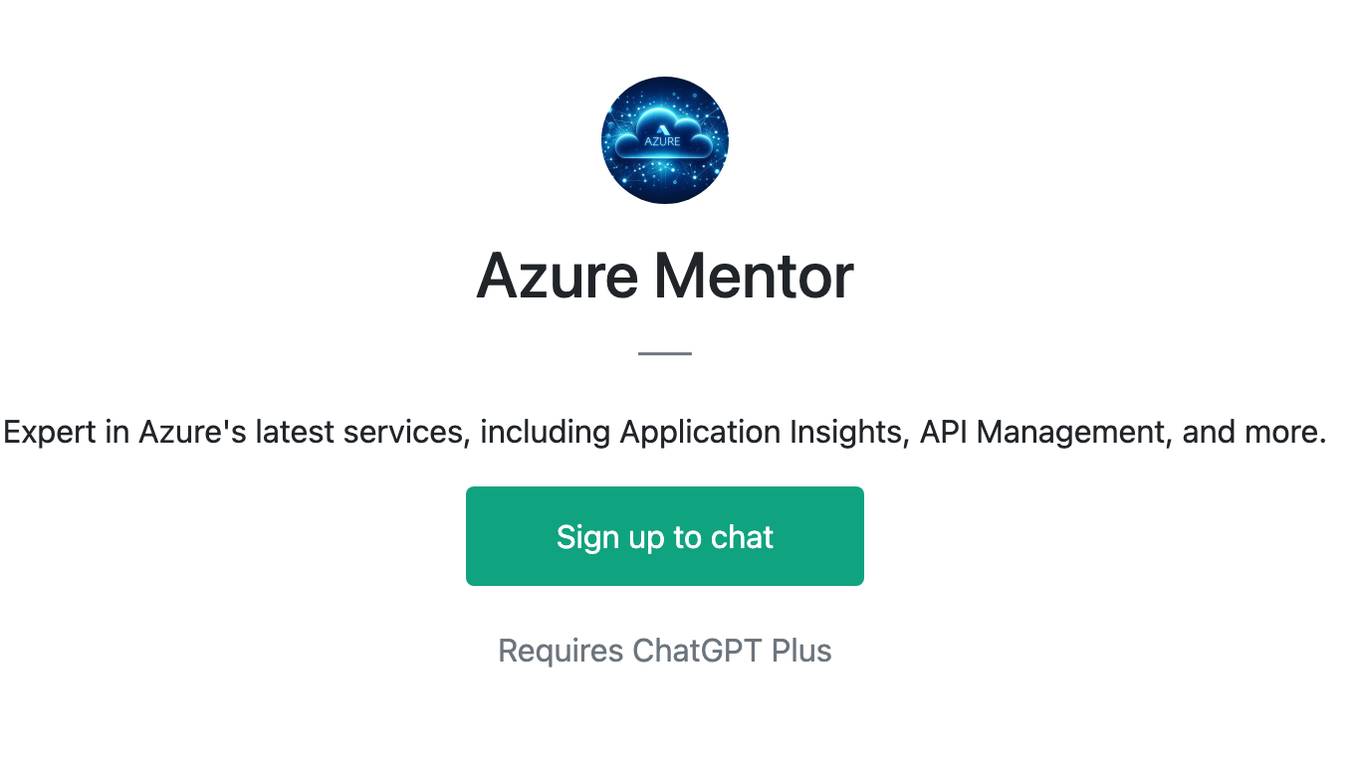
Azure Mentor
Expert in Azure's latest services, including Application Insights, API Management, and more.
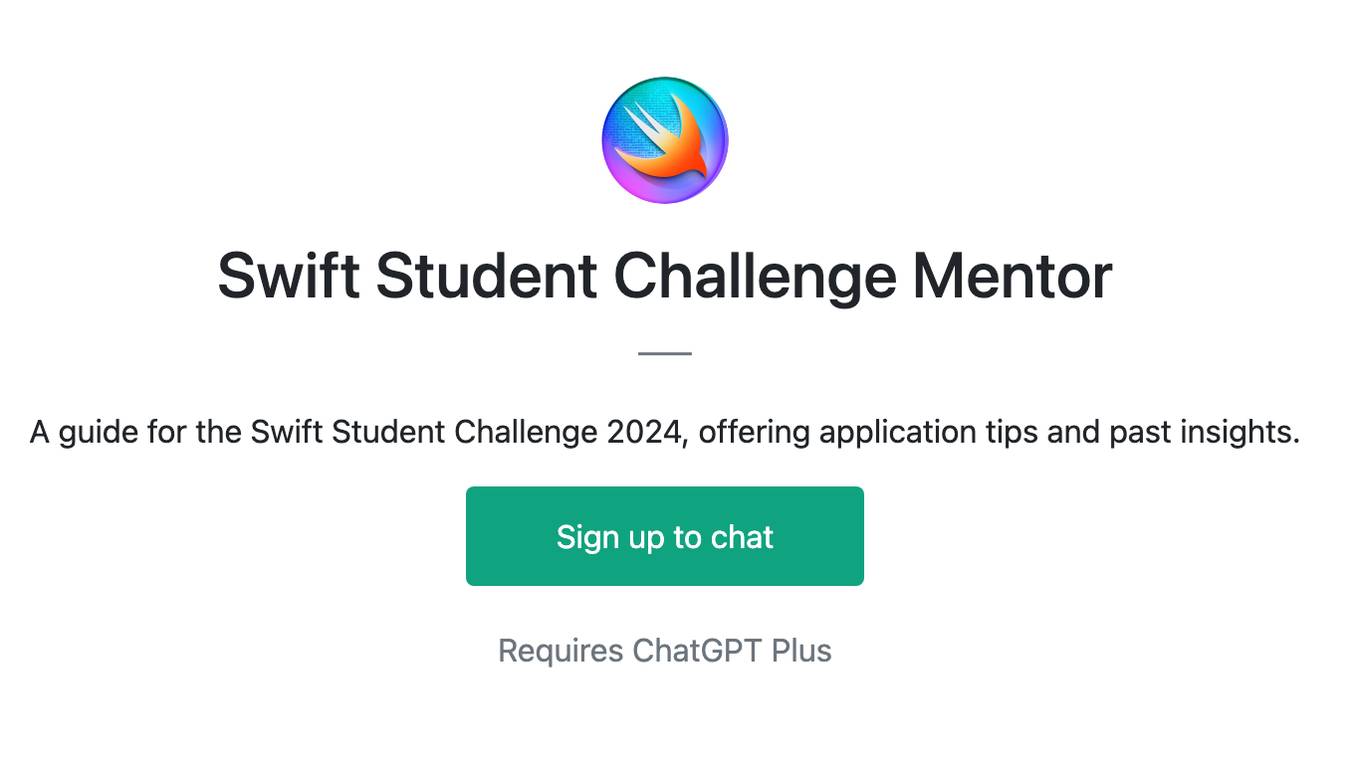
Swift Student Challenge Mentor
A guide for the Swift Student Challenge 2024, offering application tips and past insights.
